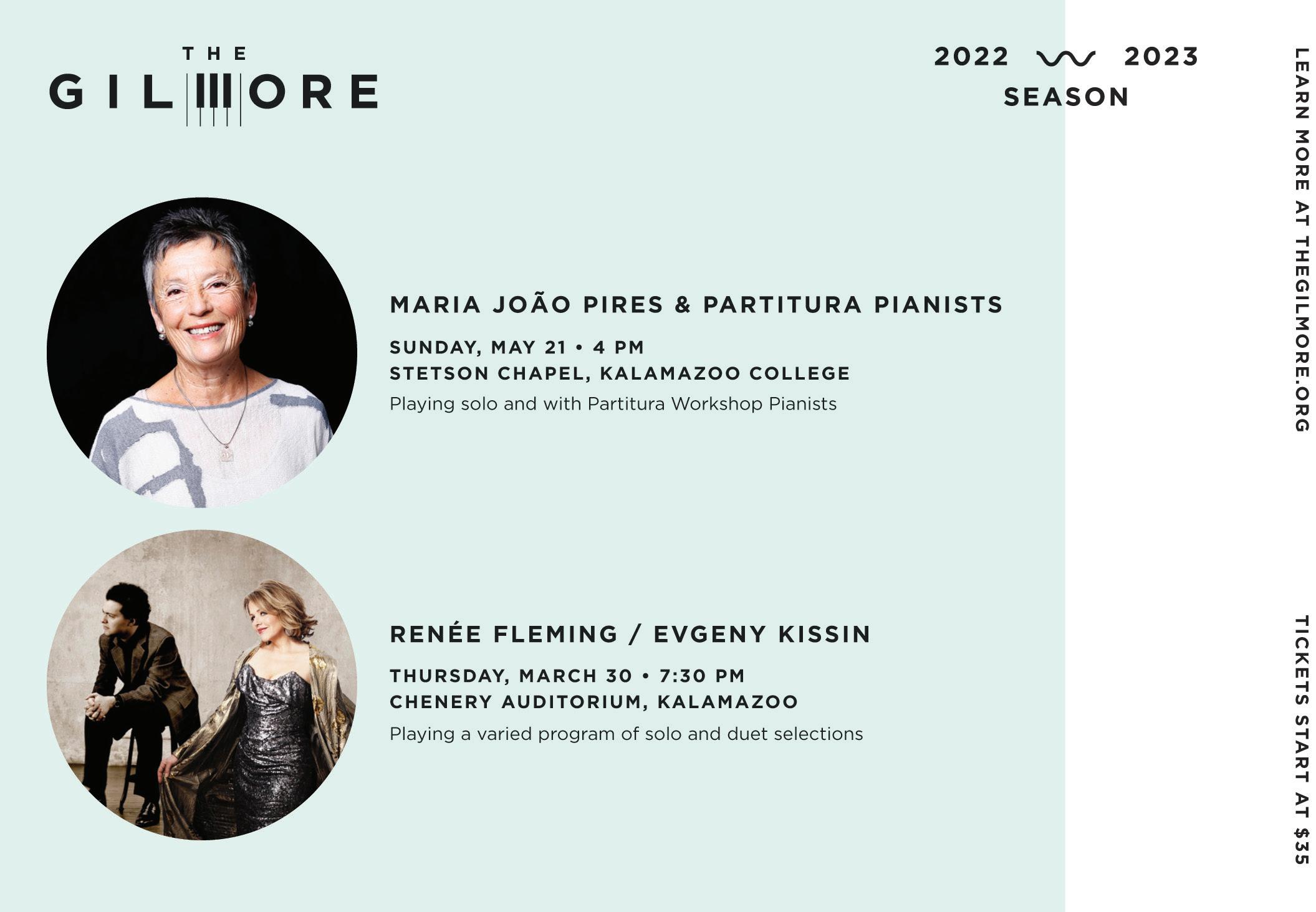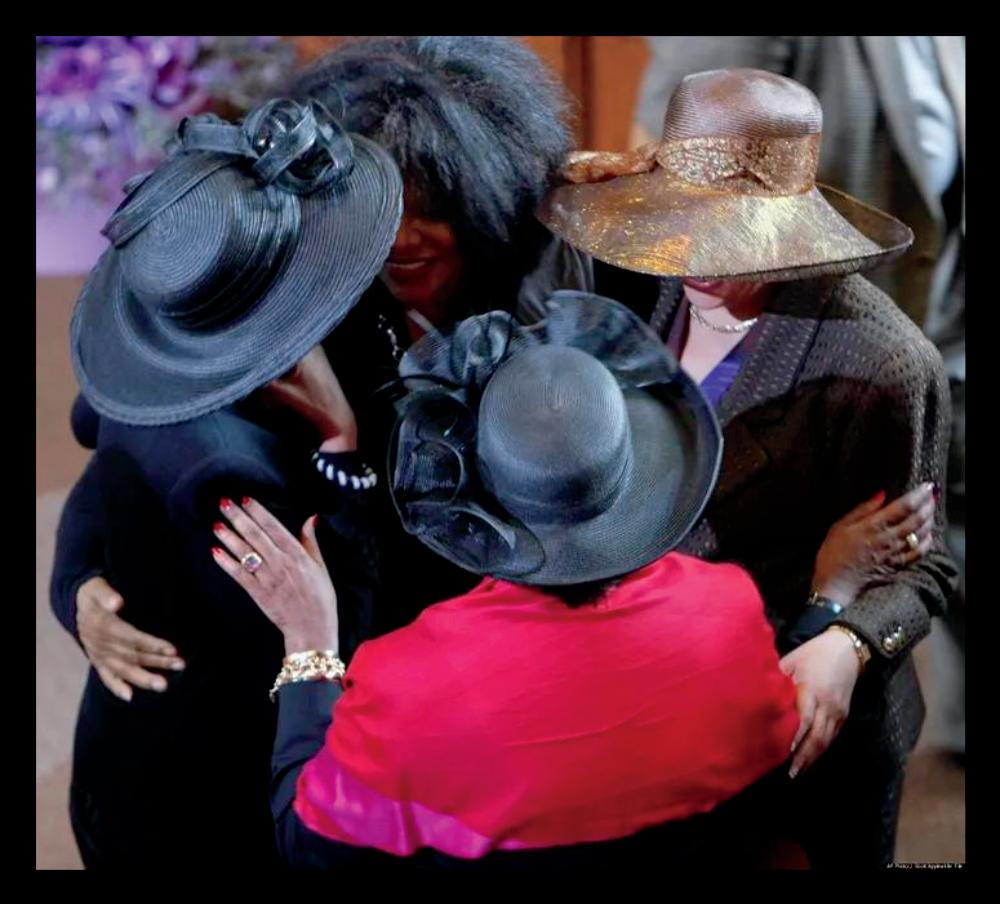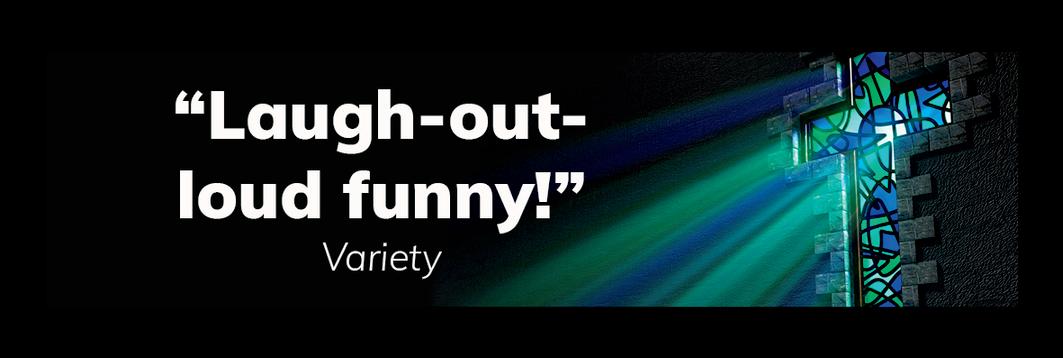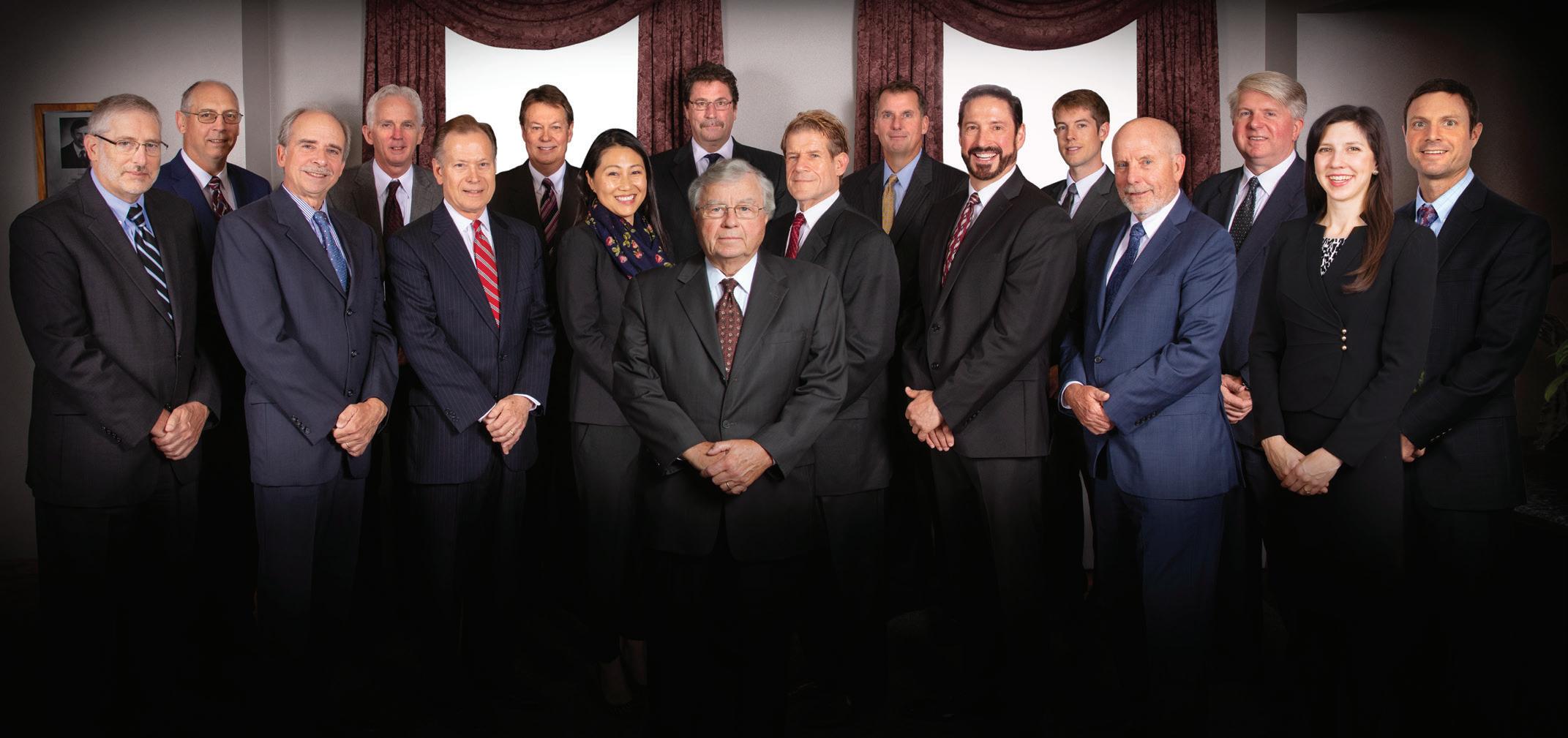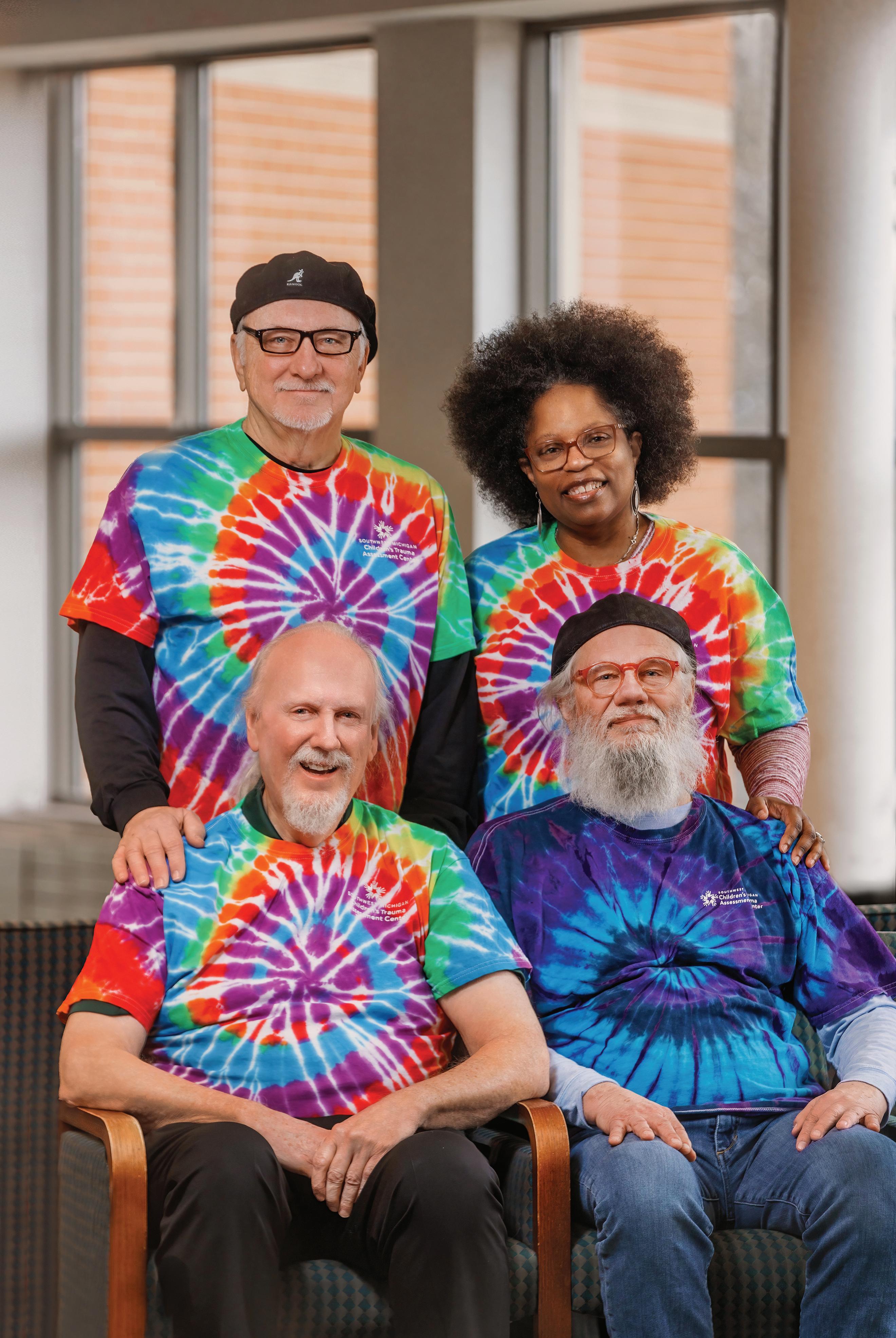



















We first wrote about the Southwest Michigan Child Trauma Assessment Center (CTAC) in Encore back in 2015, when it had been open and assessing children in the local child welfare system for 16 years. It had a grant-funded budget then of only $770,000 and had assessed 3,000 kids. Now, eight years later, it has $13 million in grants, a satellite center in Cadillac, a staff of 15 and has more than doubled its impact. Its assessment methods and structure are the model for eight other trauma assessment centers established by the State of Michigan and for similar centers in Colorado. Its staff has provided training in childhood trauma and trauma assessment, secondary traumatic stress and crisis trauma response to more than 150,000 individuals across the state and beyond.

To say that what the five founders — James Henry, Ben Atchinson, Mark Sloane, Yvette Hyter and Connie Pond-Black — created has had an impact is an understatement. Their work has made lives better for thousands of kids and their families across the state. It’s very much like that ripple in the pond: better lives mean mentally healthier kids, which mean decreases in child suicide, substance abuse, violence and crime.

I was honored to be the one to revisit CTAC to write our cover story in this issue. It was written as part of the Mental Wellness Project — a solutions-journalism initiative of the Southwest Michigan Journalism Collaborative, which is composed of 12 local media outlets that have come together to improve local news coverage in our community. For the past two years this project has explored mental health issues in Southwest Michigan with an eye on what is working and what is yet to be done. This important journalism work has been supported by a generous grant from the Solutions Journalism Network and the Kalamazoo Community Foundation. I invite you to see all the outstanding reporting and stories that this project has produced at swmichjournalism.com. It is reporting that is critical to our community and deserves wider appreciation and awareness as it spotlights what high-quality local news coverage can achieve.
As Encore turns 50 this year, we are proud of our half-century of being one of our community's trusted news sources. Thank you to all of you who support Encore by reading, subscribing and patronizing our advertisers, because it is you who have allowed us to continue to do this critical work. With your support, we will continue to do it for years to come.
Publisher encore publications, inc

Editor marie lee Designer alexis stubelt
Photographer brian k powers
Contributing Writers kalloli bhatt, lynn houghton, marie lee
Copy Editor margaret deritter
Advertising Sales janis clark, janet gover, krieg lee

Distribution robert zedeck ron kilian
Office Coordinator kelly burcroff
Proofreader hope smith
Encore Magazine is published 12 times yearly. Copyright 2023, Encore Publications, Inc. All rights reserved. Editorial, circulation and advertising correspondence should be sent to:
www.encorekalamazoo.com


117 W. Cedar St. Suite A, Kalamazoo, MI 49007
Telephone: (269) 383–4433




Fax: (269) 383–9767




Email: Publisher@encorekalamazoo.com
The staff at Encore welcomes written comments from readers, and articles and poems for submission with no obligation to print or return them. To learn more about us or to comment, visit encorekalamazoo.com. Encore subscription rates: one year $36, two years $70. Current single issue and newsstand $4, $10 by mail. Back issues $6, $12 by mail. Advertising rates on request. Closing date for space is 28 days prior to publication date. Final date for print–ready copy is 21 days prior to publication date.
The opinions, beliefs and viewpoints expressed by those interviewed and published here do not reflect the opinions, beliefs and viewpoints of Encore Magazine or the official policies, owners or employees of Encore Publications
Kalloli says she was surprised by her interview with Kim Shaw, the program director of the Arts Council of Greater Kalamazoo.


"For someone who is directing a lot of events throughout the year, making time to sit with artists to discuss grants and make sure they make the best decisions for themselves is amazing," Kalloli says. "It shows a real dedication to the artists and the community." Kalloli is an Encore intern and a student at Western Michigan University majoring in journalism and digital media.
It isn't often that Marie, the editor of Encore, gets out from behind her desk to put her reporting chops to work, but she had the opportunity to do so with two stories this month. First is the cover story on the impact the Southwest Michigan Child Trauma Assessment Center at Western Michigan University has had on the community, the state and beyond. "It's amazing what five people who care a lot about kids came together to create," Marie says. "The center's growth is evident in its increased funding and number of clients served, but its vital impact is felt in the daily lives of thousands of children helped since its founding and by the families, schools and communities of those children."
Marie also wrote about Kalamazoo Dry Goods and its owner, Rebecca Macleery, for this issue. “Rebecca and I are kindred souls in that we love repurposing little treasures such as buttons, chandelier crystals and trinkets," Marie says. "But her shop takes that to a whole new level with its deadstock fabrics, natural fibers and art supplies. Her ingenuity and creativity are inspiring."
An organized garage
If your garage has room for everything but a car, don't worry, you're not alone.
Your entryway may be the space your family uses every morning but it’s also the first impression guests get when they enter your house. It’s easy to see why this area needs to be both functional and representative of your overall style. Murphy beds are a unique multi-functional bed that are perfect for having guests over and provides extra space when folded up in your bedroom, study or even the family room when not in use!


garage is where we toss everything that doesn't have a place in the house. If you find yourself using your garage as a receptacle, your garage may need a



Let us help make functional extra spaces in your home.
If your garage has room for everything but a car, don't worry, you're not alone. The garage is where we toss everything that doesn't have a place in the house. If you find yourself using your garage as a receptacle, your garage may need a serious overhaul. Storage units, shelving plans, and room for everything will help organize. Let Halls, Closets & More advise you on the best way to make your garage a space to be proud of.

4205 S. Westnedge Ave., Kalamazoo 269.384.2170 • elinaorganics.com
National award–winning, handmade organic, clinical skin care products and services, made in Kalamazoo. Voted best facial of Chicago by Chicago Magazine and Best Facial for Glowing Skin by CS Magazine

Explore. Shop. Enjoy
205.433.9377 • genesisfitwell.com
Let our certified in–home personal trainers help you reshape your approach to achieving fitness and function. There has never been a better time to exercise in the privacy and safety of your own home.

2413 Parkview Ave. 269.553.6506 • kazoobooks.com

New and used books! Parking and entrance in back. We specialize in orders for new or used titles. Call ahead for pick up or come in and browse, safely. Visit us for a unique local bookstore experience.

269.779.2900
Studio 301, Park Trades Building 269.720.7649 • briankpowers.com
Whether they are just starting out or ready for an updated image, a studio headshot session is the perfect gift for the young or seasoned professional in your life. For $175, give someone the gift that shows your love, support and admiration.
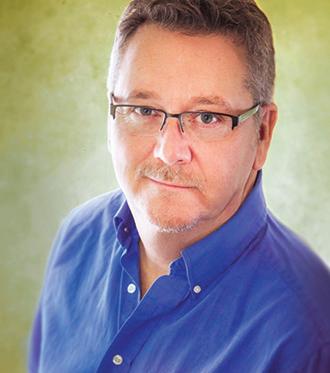
AdvancingLives.myasealive.com Jacque@AdvancingLives.com
Good health doesn’t just happen. To have it, we must be intentional. If we don’t have time for our health today, we won’t have health for our time tomorrow. Have you had your molecules today?
Let’s Talk Redox.TM


If you like laughing until your stomach hurts, four comedy acts this month will bring you an opportunity to cackle like no one’s watching: Bored Teachers, a viral TikTok sensation that brings much-needed relief and a sense of community to educators worldwide, is coming to the State Theatre at 7 p.m. April 13. This group of teachers talks about the daily struggles of managing a classroom and the hilarious stuff they hear every day. Tickets are $35–$55 and, as with other State Theatre shows, are available at kazoostate.com or the box office.
Chelsea Handler, author of the best-selling book Life Will Be the Death of Me and star of comedy specials, will provide a retrospective look at her career as a comedian in two shows at the State Theatre, at 7:30 p.m. April 15 and 7 p.m. April 16. Tickets are $49.50–$99.50.

Joe Gatto, the improvisational comedian best known for his TV shows Impractical Jokers and The Misery Index, will perform at 7 p.m. April 21 at Miller Auditorium. Tickets are $39.75–$159.75 and available at millerauditorium.com or the box office.
Nate Bargazte, whose comedy tackles meaningless issues from day-to-day life, will perform two shows at the State Theatre on April 28. The 7 p.m. show is sold out, but tickets were still available for the 9:30 p.m. show at press time. Tickets are $39.75–$69.75

Snarky Puppy to perform
Four-time Grammy winner Snarky Puppy, a Texas-bred, New York-based jazz collective, will perform at 8 p.m. April 2 at the State Theatre.

Snarky Puppy offers a convergence of Black and white American music with hints of Japan, Argentina, Canada and the United Kingdom. The group has as many as 25 members in regular rotation. They will be joined by the opening act C4 Trio. Tickets are $37.50–$57.50 and available at kazoostate.com or the box office.
The annual Kalamazoo Foodways Symposium — aligning with the Kalamazoo Valley Museum's media literacy exhibit, Wonder Media: Ask the Questions! — will explore how food and media intersect.
The events will include a presentation by food media expert Emily Contois at 6 p.m. April 10 at Kalamazoo Valley Community College's Food Innovation Center, 224 E. Crosstown Parkway, and an outdoor Foodways Festival from 11 a.m.–2 p.m. April 15 outside the center. The festival will feature lectures, workshops, demonstrations and food tastings.
The events are free.
For information, visit kalamazoofoodways.org.

Please send your questions to:
With celebrities, comic creators, cosplay and more, the Grand Rapids Comic Con Spring Fling is hitting the road and coming to the Kalamazoo County Expo Center April 14–15.

This comic book and popular arts convention will include appearances by stars from Star Trek DS9 and Mighty Morphin Power Rangers, voice actors, and YouTube personalities. In addition, comic artists and creators such as Jim Steranko (Strange Tales, Nick Fury, Captain America, X-Men) and Scott Rosema (Space Ghost, Batman: The Animated Series) and Godzilla artist Yuji Kaida will be on hand.
The hours for the show are noon–7 p.m. April 14, 10 a.m.–7 p.m. April 15 and 10 a.m.–5 p.m. April 16. Daily tickets are $22–$29, or $5 for children ages 5–12. A three-day pass is $55. For more information, visit grcomiccon.com.
Our Planet: Live in Concert at Miller
The Emmy Award-winning series Our Planet is now a live concert event set for 7 p.m. April 5 at Miller Auditorium.

New orchestration by Oscar-winning composer Steven Price will be performed live on stage while footage from the documentary series is shown, showcasing species, natural wonders and wildlife spectacles.
Tickets are $35–$40 and are available at millerauditorium.com or the box office.






Q. My husband is going into a nursing home. I’ve been told it is possible for me to create a trust and protect my assets from the spend down at the nursing home. Is that true?
MICHAEL J. WILLIS, J.D., C.P.A., WILLIS LAW
Please send your questions to:
Michael J. Willis, J.D., C.P.A.
A. A tenancy by the entirety is a form of ownership where a married couple, together, own undivided interest in a property. When the coowners are married, tenancy by the entirety is presumed, and does not necessarily need to be mentioned specifically in the deed or conveyance. The married persons each have a survivorship right, which means that the surviving co-owner automatically owns the entire property when their spouse passes, without the asset passing through probate.
A. In Michigan, a Ladybird deed allows a Grantor to transfer his orher real property upon death to a named beneficiary, the Grantee, while avoiding the probate process. The Ladybird deed is appealing because the Grantor will typically retain the right to sell or mortgage the property, or convey the property to another third party at any time, thereby not losing control. Further, the property receives a full “step up” for capital gains tax purposes on the death of the Grantor (this is not available without the reserved life estate or additional powers). The Grantor’s interest is called an enhanced life estate, and the Grantee’s interest is a remainder interest (subject to divestment).

Willis Law 491 West South Street Kalamazoo, MI 49007 269.492.1040 www.willis.law

Q. My husband is going into a nursing home. I’ve been told it is possible for me to create a trust and protect my assets from the spend down at the nursing home. Is that true?
A. Yes. Most often when folks talk on trust planning, they are referencing a revocable trust. In fact, that is the case probably more than 99% of the time. A revocable trust under Michigan law generally is set up only to avoid probate--that’s its only benefit. However, there is an irrevocable trust for persons in your circumstances that can be established with your assets to the extent they exceed the protected amount (which under Michigan law will cap at a little over $125,000).
Neither husband nor wife may sell or transfer their interest in the property without the other’s consent. Further, the creditors of one spouse may not attach to the property and force its sale to recover debts unless both spouses consent to the transaction or are liable to the creditor.
to seek counsel before implementing this technique or any other Medicaid planning. 9471992-01
If the trust is irrevocable and the assets are effectively established in an annuity income stream back to you per the terms of the trust, then in such a circumstance the trust will no longer be considered a countable asset, but instead an income stream and thereby exempt for Medicaid purposes. This is a sophisticated planning technique, and I highly encourage you to seek counsel before implementing this technique or any other Medicaid planning.
A. Yes. Most often when folks talk on trust planning, they are referencing a revocable trust. In fact, that is the case probably more than 99% of the time. A revocable trust under Michigan law generally is set up only to avoid probate--that’s its only benefit. However, there is an irrevocable trust for persons in your circumstances that can be established with your assets to the extent they exceed the protected amount (which under Michigan law will cap at a little over $125,000). If the trust is irrevocable and the assets are effectively established in an annuity income stream back to you per the terms of the trust, then in such a circumstance the trust will no longer be considered a countable asset, but instead an income stream and thereby exempt for Medicaid purposes. This is a sophisticated planning technique, and highly encourage you to seek counsel before implementing this technique or any other Medicaid planning.
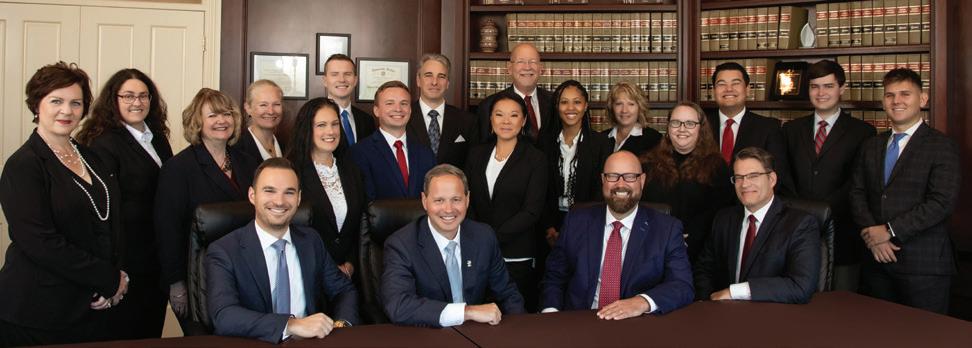
Of interest, it is generally believed that a form of the Ladybird deed was used by President Lyndon Johnson to transfer property to his wife, “Lady Bird” Johnson, hence the name of the deed today.
A tenancy by the entirety may only be dissolved through death, mutual consent or divorce.
Q. What does it mean when a married couple holds property as tenancy by the entirety?
There are many ways to learn about local history, including the many cities, villages and towns that make up Kalamazoo County. A fun way is to find and read the various historical markers found on buildings, in parks, on churches, in cemeteries and even on homes across the county. While these markers come in different shapes and sizes, the most prevalent ones are those green Michigan Historical Markers that highlight state history. This marker program began in 1955 and offers a map of the historical sites at dnr.state. mi.us/HistoricalMarkers. A little closer to home, here are five of my favorite markers or memorials:


Technically these would not be considered historical markers, but they certainly qualify as offering historical information about the area. There are 25 street signs that not only give the name of the street but have the emblem of the Match-E-Be-Nash-She-Wish Band of Pottawatomi Indians, indicating the boundary of the reservation given to them as a result of the Treaty of Chicago of 1821. The land amounted to nine square miles, comprising a large part of what is now the city of Kalamazoo. The U.S. government broke the treaty in 1827, forcing the band to leave. They eventually moved to the Gun Lake area. These signs, installed in 2019, were a project of the Kalamazoo Reservation Education Committee.
Mounted on a boulder and found on Egleston Avenue just east of Race Street, this marker notes the site where the 25th Michigan Volunteer Infantry, made up primarily of Kalamazoo County men, camped and drilled in September 1862, before traveling to Kentucky to fight in the Civil War. Now part of the Edison neighborhood, this area during that time was part of the National Driving Park, which held horse races and a variety of fairs across its 64 acres. The infantry unit, originally made up of more than 800 soldiers, saw action in Kentucky, Tennessee and Georgia until it was mustered out in June 1865. It held annual reunions and in October 1923 dedicated the original bronze marker, which has been replaced twice. While hard to make out in the photo above, the inscription on the marker is more legible when viewing in person.

Drivers pass this marker every day, but if they were to stop, they could learn about a vegetable once very popular here: celery. It is not known who introduced the first celery to the area, but what is known is that by the end of the 19th century hundreds of growers, many of them Dutch, took advantage of the soil found on the north and south sides of Kalamazoo and in the communities of Comstock and Portage to grow a white and yellow type of celery popular for eating and cooking and as an ingredient in patent medicine and cereal. When this marker was installed in 1958, the industry was waning in this area, with many of the growers changing to producing bedding plants.
Most of the facts on this marker are correct, but the exceptions include the date of construction of the building and the location of the Peninsula Restaurant (not to be confused with the Olde Peninsula Brewpub which was located on this site from 1996–2021). The building actually is older than the marker indicates and has a much more interesting history. Completed in 1855 and named for Bissel Humphrey, a local resident, this building has housed many businesses, institutions and organizations over the years, including an armory where many Civil War recruits drilled. The local YWCA found a home here when it organized in 1885. The marker is correct that the Folz clothing store, Parsons Business School and the Kalamazoo Stove Co. store were once located here. For some reason, the building’s name was changed to the Peninsula Building in 1961, even though the namesake restaurant was located on the other side of the street.



When Kalamazoo Public Schools was established in 1833, education consisted of what is now grades one through eight. Over the next 25 years, the state of Michigan allowed communities to organize union school districts and tax property owners for primary grades and, by 1859, even high schools. The KPS district purchased land at what was then South West Street and West Vine in 1857, opening the Union School two years later. By 1871, three residents filed suit, claiming that they should not have to pay taxes for secondary education. Three years later both the Circuit Court and the Michigan Supreme Court disagreed, upholding public taxation for financing this level of education. The State Bar has added this case to its list of Michigan Legal Milestones.

Lynn Houghton is the regional history curator of the Western Michigan University Archives and Regional History Collection. She leads the Gazelle Sports Historic Walks, a series of free architectural and historic walks at various locations in Kalamazoo County that happen during summer and fall, and is the co-author of Kalamazoo Lost and Found, a book on Kalamazoo history and architecture. She also participated in the PBS documentary series 10 That Changed America, about the history of architecture and urban planning. She has bachelor’s and master’s degrees in history from WMU and a master’s in library and information science from Wayne State University.

Rebecca Macleery is the owner and curator of Kalamazoo Dry Goods, a shop at 833 South St. that sells deadstock fabrics (leftover fabrics not used for their original purpose), natural fibers and yarns, art supplies, and items for the home. But that wasn't her original plan.

The Kalamazoo native, her husband, Greg, and their four children moved back here from Lexington, Kent ucky, in 2013. She had worked for years in the nonprofit sector in Kentucky,
most recently as the executive director of a shelter for homeless and runaway youth for seven years.
"I was really burned out," she says, "and Greg was traveling all the time, so I decided to come back to Kalamazoo," where her mother and sisters were living.
Macleery took a job as the head of The Montessori School, but she admits it wasn't a good fit. She left the post in less than a year. "I
really felt my skills needed to be used for the people who needed me most," she says. She then went to work for Head Start and then at the Boys and Girls Club of Kalamazoo, where she stayed for seven years.
When the club's longtime executive director, Bob Ezell, retired, Macleery decided it was time for her to forge a new path as well. She took a part-time job running the Center for Transformation, a local nonprofit organization that, through mentoring, helps formerly incarcerated individuals rebuild their lives.
Aiming for an art space
At the same time, Macleery, who had been longing for a way to embrace her passion for creative reusing and repurposing of items, bought a former day-care center on South Street with the vision of using her nonprofit experience to create Loose Parts Studio, a membership-based community art space that would offer classes and workshops and provide a physical space for people to be creative.
"I love loose parts, little things for creative reuse that can that spur creativity and inspiration but sometimes get overlooked, like pieces
from chandeliers and buttons. I love salvaging those, they're little treasures to me," Macleery says.

She renovated the space herself, installing new flooring, hanging drywall and painting, and finally, in February 2020, Loose Parts Studio was ready to open.
Three weeks later, the Covid-19 pandemic hit. Stores closed and schools shut down. Macleery’s husband, whose job in the service sector was considered essential, still went to work every day. But she didn't and was now at home full time with two elementary-schoolage children who were attending classes virtually. Her part-time income from the Center for Transformation wasn't enough to cover the mortgage for the dream she had been building on South Street. Selling fabric online
One day, while perusing Facebook Marketplace, she found a storage unit for sale that was full of bolts of fabric.
"It was kind out of desperation, I guess, because I thought, 'Well, this is something I can try to sell,'" she says. "Here was something that's salvage and that fits my idea of creative reuse and all the things I had been envisioning and working toward for the past couple of years."
She bought it all and spent time learning everything she could about fabric. "It turned out a lot of it was really beautiful wool, and there were some really iconic designs from top designers for the midcentury-modern period," she says.

Macleery then began an e-commerce business under the Loose Parts Studio name and started selling the fabric online. She found out quickly that she had stumbled onto something.
"It was bringing in a little income and keeping our heads above water, and it was something I could do while my children were at home," she says. "I started getting good at going out and finding deadstock fabrics — fabrics that are no longer usable by the initial purchaser. Some people call them remnants, but that's not always the case. Sometimes it's an upholstery shop that has shut down and they have a whole back room full of inventory. Or sometimes a fabric will have a flaw somewhere within the roll and they would normally throw out the whole roll. It's things that would otherwise generally end up in a landfill or sitting unused in a back room somewhere."
Macleery began seeking out large inventories of fabric with good value, focusing on natural fibers such as wool or wool blends and driving as far as Connecticut or North Carolina to buy them. Her online buyers included everyone from avid sewists and people who reupholster mid-centurymodern furniture to Renaissance fair enthusiasts and Civil War reenactors who want their costumes to be as authentic as possible.
"It just really took off. I made more income last year selling fabric online than I ever did being an executive director of a nonprofit," Macleery says, even though only "about 10 percent" of the fabrics she has available are featured on her e-commerce site.

Opening her shop
Even with her e-commerce success, Macleery still longed to have an artistic space for people to connect and create. She landed on opening a store that would sell fabrics and natural fibers as well as items for the home and more. It was such a shift in direction from her original plan to create a community art space that she found herself "right back at the start," establishing her third new business in six years. She rechristened the shop Kalamazoo Dry Goods, which officially opened for business in February and sells products both in person and online.
"It conveys a simpler existence," she says of the name. "You know, working with our hands, working with natural fibers, cleaning our homes without chemicals."

Many of the products sold by Kalamazoo Dry Goods are used for creating — from custom hand-dyed yarns made in Oregon and silk embroidery thread imported from France to indigenous-made, plasticfree watercolor painting kits and natural powdered pigments that can be used to make pastels, watercolors or wax crayons.

Macleery says there's an emphasis on the products she carries being sourced from local makers or small producers. For example, the store features roving (fiber that has been processed but not yet spun into yarn) and yarn from Natural Cycles Farm in Allegan.
"Lorie Evesque raises these rare breeds of sheep and uses the wool to make all her own roving and yarns that are hand-dyed using natural dyes," Macleery says, running her hand over a fluffy pile of roving in varying hues of burgundy. "You can spin the roving and make your own yarn to knit with, so it’s climate-beneficial because most commercial yarns are made using chlorine, which is really bad for the environment.

"We offer people an alternative to what they're going to find at Joann's or Michael's or Hobby Lobby. My goal is to really inspire people. I want this to be a place of inspiration and connection just as much as I did when I was creating it as a community art space."
In addition to deadstock fabrics, Kalamazoo Dry Goods also carries fabrics and wallpaper with iconic designs by William Morris, the
Where: 833 W South St. When it’s open: 10 a.m.–3 p.m. Friday, 10 a.m.–6 p.m. Saturday and noon–3 p.m.
Sunday
How to get more info: 365-2765 or kalamazoodrygoods.com

19th-century designer, political theorist, environmentalist and poet.
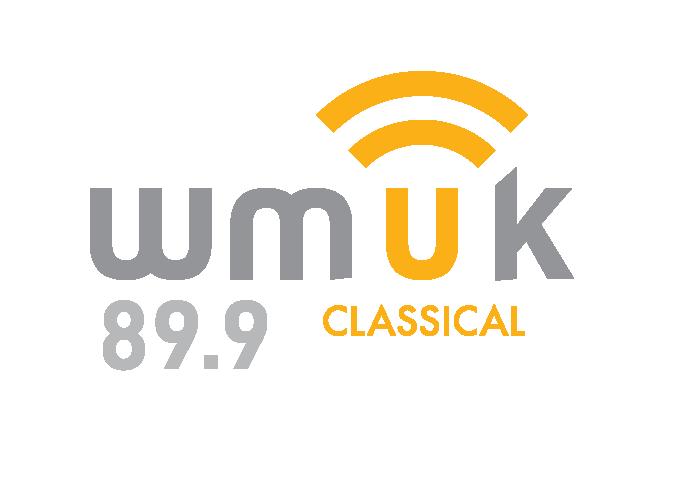
"Those are the only fabrics that I sell that are not deadstock. because I love William Morris and his fabrics so much," Macleery says.
As the seasons change, Macleery still has a few more ideas to implement. When she was preparing the facility to be Loose Parts Studio, she put in a large garden space with native plants with the intention of it being an outdoor creative space. Now, in keeping with the Kalamazoo Dry Goods focus, she wants to refashion it into a "weavers' garden."
"I have this incredible garden that I'd like to incorporate, but I'm seeing a different way of incorporating it now. I'd like to grow plants there that people can harvest and use to dye fabrics. I can even grow flax, and then people can spin it and then dye it. I'll have space for tables and messy art and classes and things like that to happen out there. A lot of people want to teach or to take fabric dyeing classes, and you need a really big, messy outdoor area."
Macleery admits that while much of the facility is a store that sells things, her ultimate goal is for Kalamazoo Dry Goods to be "more than just a transactional experience for people."

"I really want them to see me and my vision and what I'm creating," she says. "It's always existed in my head in one form or another, but now it's out here for the community to see and to embrace or not embrace."


When social worker Jim Henry met the 7-year-old, she was living with an aunt after her mother had died.
The girl was struggling in school. Wasn’t sleeping. Had emotional issues.
Henry drew two houses on a whiteboard and pointed to one. “This is your aunt's house,” he said, and then, pointing to the second house, said, “I know you lived with your mom here.” Then he asked, “So how did you get from your mom's house to your aunt’s house?”
The little girl took the marker out of Henry’s hand and drew a stick figure with a noose around its neck.
“That immediately tells us that her mother’s suicide is ever-present for her,” Henry says, “and her view of everything comes from ‘My mama hung herself.’”
Henry told the little girl, “You know, I've talked to a lot of kids whose mom and dad have either died or they've hurt themselves. And lots of times the kids feel like ‘I could have done something to stop it.’”
The 7-year-old jumped up from her seat. “I never should have gone to the soccer game,” she said to Henry, “because if I wouldn't have gone, my mom would still be alive. It was my job to make sure she was safe because she always talked about killing herself. But I went to the soccer game.”
“Now that's the trauma, the death of mom," Henry explains in retelling the conversation. "The impact is ‘I killed my mom.’”
“We went on a little longer and then she looked at me and said, ‘It's like you're right in my head,’” recalls Henry. “That was really important because oftentimes kids with trauma don't trust others. But if a child feels
listened to and thinks that you understand what it's like to be them, it opens up this validation that they are not abnormal. And that’s the first step in helping them to heal the damage from the trauma.”
About twenty-three years ago, Henry and four other Kalamazoo-area professionals launched the Southwest Michigan Child Trauma Assessment Center at Western Michigan University. At the time, few people knew how traumatic experiences can negatively affect the developing brain of a child. But the founders of CTAC did. And the center they created to assess traumatized children has not only become the model for similar centers across Michigan and in Colorado, but also has effected change in the state’s child-welfare system and beyond.
CTAC has grown from its original five founders to a staff of 15, opened a second center in Cadillac, and earned more than $13 million in grant funding for its work. In addition, the center has trained more than 150,000 individuals in identifying trauma in children and its effects.
The center was founded in November 1999 by Henry; social worker Connie BlackPond; pediatrician Dr. Mark Sloane; Ben Atchison, then a professor and chair of the WMU Department of Occupational Therapy; and Yvette Hyter, then a professor in WMU's Department of Speech, Language and Hearing. Their aim was to work specifically with children in the child welfare system.
"Between the five of us, we had 150 years of working with child maltreatment," says Henry, the center's project director. "We had come to the point in our careers where

we wanted to take the next step and create something that was going to help these kids' trajectories as well as help them build resiliency.
"We want to replace the question of 'What's wrong with this kid?' with 'What happened to this kid and how does that affect his/her behavior, academics, brain?’ to change the understanding of children's behavior from the typical American culture of 'it's willfulness' to viewing it with a trauma-informed lens."
The five founders created an extensive screening tool to assess childhood trauma that not only looked at the trauma a child has been exposed to, but how those traumatic events affected that child's cognitive,
46%
of children 17 and under reported at least one traumatic event, according to the 2016 National Survey of Children’s Health.
82%
of children receiving treatment in the child-welfare system have experienced at least one traumatic event.
emotional, behavioral functioning and mental health.
But it wasn't enough to assess kids for trauma. The founders discovered that they needed to change the system so that adults who touched these kids' lives — from medical professionals, teachers and judges to caseworkers and caregivers — were well informed about trauma, understanding trauma's effects and knowing how to give traumatized children specific support.
Traumatic events may include neglect, abuse, community or school violence, serious accidents, life-threatening illness or the sudden loss of a loved one (see infobox above).
A child who has experienced trauma can
Potentially traumatic events include:
• Neglect
• Psychological, physical, or sexual abuse
• Community or school violence
• Natural disasters
• Terrorism
• Witnessing or experiencing intimate partner violence
• Commercial sexual exploitation
• Serious accidents, life-threatening illness, sudden or violent loss of a loved one
• Refugee and war experiences
• Military family-related stressors (e.g., parental deployment, loss or injury)
Among children with a history of trauma:
• 41 percent have had suicidal thoughts.
• 23 percent have attempted suicide.
become anxious, fearful and depressed, cry and scream frequently, and have difficulties sleeping, eating and concentrating. Once these kids reach middle- and high-school age, they may develop eating disorders or self-harming behaviors, abuse alcohol or drugs and engage in risky sexual behavior.
"When children are traumatized, it eventually affects the entire community," Gretchen Slenk, a former CTAC social worker, said in a 2016 interview published in WMU Magazine. "It can be hard to see the hurt 6-year-old in the 35-year-old convict, but he's there."
Since its founding, CTAC has assessed more than 6,000 children ages 3 months

Child trauma survivors are more likely to have:
• Learning problems, including lower grades and more suspensions and expulsions from school.
• Increased use of health services, including mental health services.
• Increased involvement with the child welfare and juvenile justice systems.
• Long-term health problems, such as diabetes and heart disease.
Signs of child traumatic stress
The signs of traumatic stress are different in each child. Young children react differently than older children.
For some children, these reactions can interfere with daily life and their ability to function and interact with others.
to 17 years old. Each child is assessed by two clinicians in a process that can take up most of a day and includes a physical exam; neurodevelopmental testing for cognition, language, memory, gross and fine motor skills, sensory processing, and social communication; and a psychosocial interview with the child. The assessment also includes interviews with parents and caregivers as well as observations of child and caregiver interactions.
In 2018, the State of Michigan spent $7.5 million to fund eight trauma assessment centers across the state that use the CTAC trauma assessment screening and whose staffs have been trained by CTAC, Henry says.
"The state adopted our model of trauma assessment and now there are eight trauma centers modeled after ours that we've provided the training for, so every kid that comes into foster care gets a trauma screening," says Henry.
The primary outcome of the screening is to provide a detailed understanding of what is going on with a child. "We use a phrase from Dr. Dan Siegel, a brain expert, who said, 'To name something is to begin to tame it,'" says Henry.
CTAC doesn't provide trauma-informed therapy, but it does outline a "resiliency plan" for each child, which is a list of recommendations for supports and therapies to help the child recover from trauma.
"We've really worked in resiliency as a component of all trauma assessments," Henry says. "Resiliency is basically three things: One, that you feel valued, loved, cared for. Two is mastery and efficacy, the ability to believe that you can be successful at something and do it well. And then third is the ability to regulate. When kids have those three, even if they've had little therapy or no therapy, they can heal from trauma. If they don't, then that certainly creates all kinds of significant challenges in their future."
About 90 percent of CTAC’s clients are youth in the child-welfare and foster-care system. But in 2020, CTAC opened the Resiliency Center for Families and Children within its Oakland Drive facility, to provide services to help families and children outside that system, especially children who have been adopted, says CTAC Clinical Director Amy Perricone.
"These are kids who have come up in the child-welfare system but have the same challenges they had before those magical adoption papers were signed," says
Perricone. "Those challenges don't go away, and adoptive families don't have access to the same kind of services that a foster-care family would have, so we've been able to see a lot of post-adoption cases and really help keep those adoptions together."

Making sure the people who are a part of children's lives understand trauma and how to support those children is a critical mission of CTAC, which it is accomplishing by training others. The 150,000 individuals CTAC has trained since 2015 include medical professionals, judges, caregivers and more than 15,000 educators.
"We take a very systems approach. If we're not touching all the different parts of the system, then we're not really going to impact the lives of our kids," says Henry.
Sloane, CTAC's medical director and an adolescent behavioral specialist, has specifically been training physicians in Michigan on the links between trauma, schools and medicine. Sloan's clinical experience includes the medication management of more than 1,200 traumatized, drug- and alcohol-exposed

children assessed at CTAC. He speaks directly to the neurodevelopmental harm caused by trauma that can result in a variety of behaviors such as anxiety, hypervigilance and inability to focus, some of which can be managed with the help of medication.
The center's impact has been felt beyond Michigan's borders. Since 2014, Henry and Perricone have collaborated with the Child Welfare Resiliency Project, a seven-county consortium in Colorado. One aim of CWRP is addressing trauma to reduce the number of children being placed in "congregate care" — group homes or institutional settings that generally have worse outcomes for children than family-based settings like foster care.
By 2019, using CTAC trauma-assessment screening tools and protocols, CWRP had screened more than 3,000 youth and achieved a 33 percent decrease in the number of children who went into congregate care.
In addition, CTAC provided guidance and a model for setting up trauma-assessment centers in the seven Colorado counties. One is the CSU Trauma and Resilience Assessment Center at Colorado State University in Fort Collins, which provides assessments for children in Larimer County.
"Our program is similar to CTAC in the sense that it's housed in a graduate clinical training program. (CTAC's program) is clinical social work; ours is marriage and family therapy," says C.K. Rizzo, CTRAC’s assistant director of operations and research. "Jim and Amy were doing trauma assessments for Larimer County Child Welfare, and the county got really excited about the assessments and put out a request for proposals to do trauma assessments. We were accepted, and Jim and Amy gave us a lot of guidance, support and education in terms of the protocol and training graduate students. They observed a lot of the assessments that we did in the beginning and offered feedback. They were
Among children who received services for trauma, after one year of treatment the percentage who:
• Had suicidal thoughts: dropped from 41 percent to 13 percent.
• Made suicide attempts: dropped from 23 percent to 5 percent.
• Had behavioral problems: dropped from 77 percent to 64 percent.
• Were anxious or depressed or withdrew from others: dropped from 65 percent to 51 percent.
• Showed improved strengths: 32 percent.
• Showed improved functioning: 20 percent.
• Reduced their problems with substance use and abuse: 17 percent.
Sources: SAMHSA, https://www.samhsa.gov/sites/default/files/brief_report_natl_childrens_mh_awareness_day.pdf
really instrumental, not only in showing us the model that they used, but in helping us to build confidence as a center.”
Henry and Perricone are also working with Colorado's justice system, providing trauma assessments for juveniles who have been accused of murder or attempted murder. In Colorado, children between the ages of 14 and 17 can be charged as adults and often end up in adult prisons, with long sentences and lifelong felony records.
"In Colorado, if you commit a capital crime, then you immediately are in adult court, even if you're a juvenile. You have to have a reverse transfer hearing to go back to juvenile court," explains Henry, "so we do the trauma assessments and testify for the reverse transfer so they hopefully can remain a juvenile rather than going to corrections.
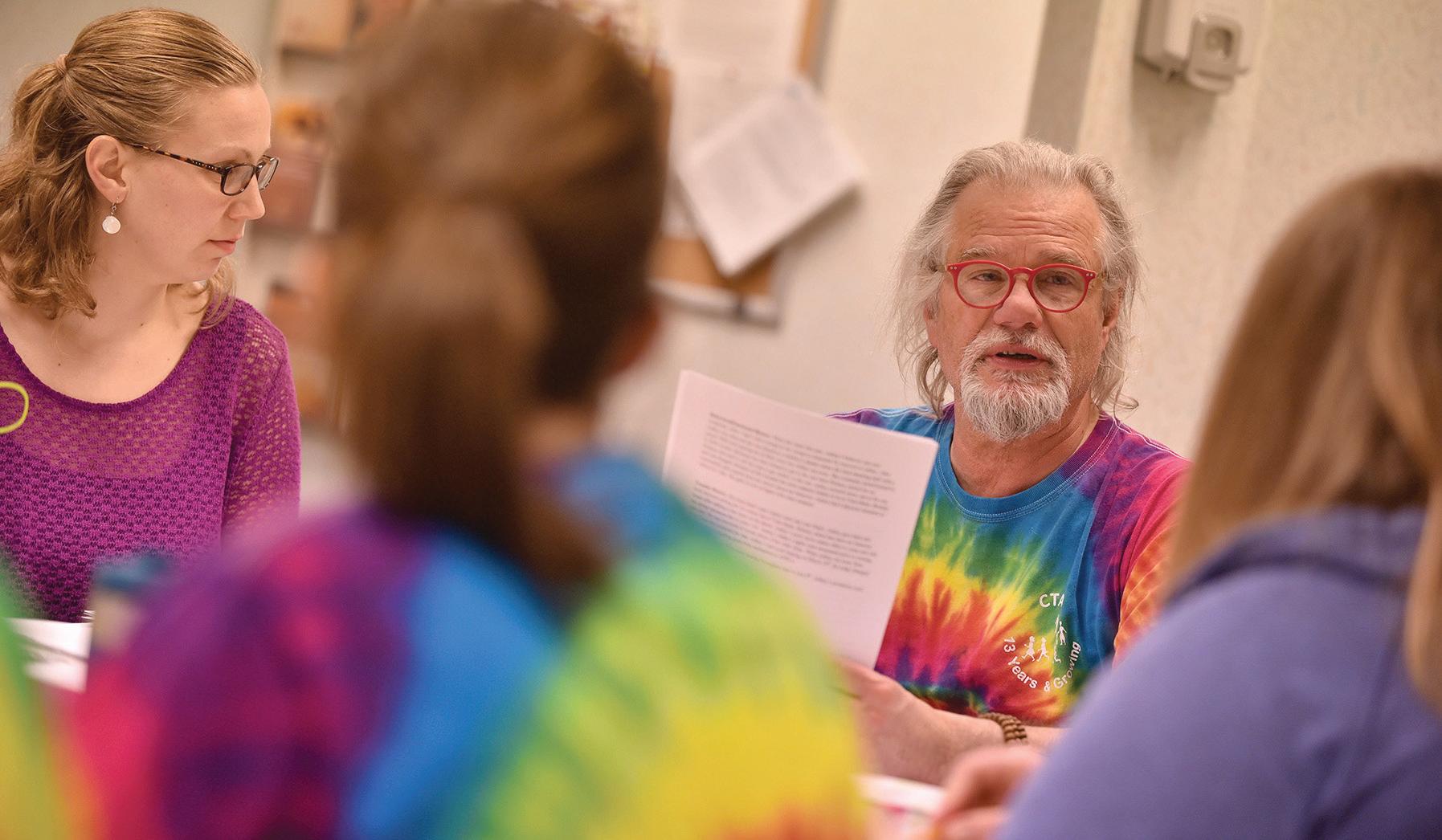
"Killing someone is a horrific manifestation of all the trauma a kid has experienced. Most of the kids we see have very significant trauma histories and serious executivefunctioning issues (problems with the mental processes that enable someone to plan, focus, remember and juggle multiple tasks) because of it. (For them) to recover, we're trying to help rewire the brain, and you need to do that within a juvenile-justice milieu that's built around resiliency versus the Department of Corrections, which is built on punishment."
Seeing and hearing children's tragic stories can have a detrimental effect on those who work with these children. This effect is called secondary traumatic stress. Perricone says that training CTAC staff to cope with secondary traumatic stress was a necessity,
especially because many of the students in the WMU School of Social Work's graduate program work at the center.
"We're sending young people out to do the hardest work, and we want them to know that secondary trauma is real, to expect it, and (to know) the ways to mitigate it and work through it," she says.

Now CTAC staff provide secondarytrauma training throughout the state. "Our curriculum focuses on understanding what secondary trauma is and ways to manage secondary trauma," Perricone says. "We want to empower staff, whether you're the director or the secretary at the front desk, to understand how working with desperate people, both adults and kids, can impact you.”
CTAC also trains crisis response teams in every county in the state of Michigan in what they call psychological first aid, which helps victims to adapt and function in the immediate aftermath of disaster, terrorism and community violence.
Henry himself is leading the trauma response efforts for faculty, staff, students and others who survived the Oxford High School shooting of November 2021, when four students were killed and seven people, including a teacher, were injured.
Of the five founders of CTAC, Sloane and Henry still work there. Atchinson, Black-Pond and Hyter retired in recent years.
Almost a quarter-century after its founding, Henry acknowledges the limitations of CTAC. He says they mainly assess children in foster care or otherwise involved with Children’s Protective Services, and even then it’s a struggle for CTAC to keep up with demand. In addition, there’s no guarantee that the center’s recommendations for treatment will be implemented.
But Henry says the growth of CTAC, as well as the funding increases that have allowed the center to expand its capacity, are evidence of its success.
"We used to have a four- or five-month waiting list but now can expedite kids coming in to about three weeks," he says.
At 70, Henry says what he still most appreciates is the "opportunity to sit with a child."
"Nothing humbles me more. And nothing is a greater gift. We developed a key phrase over the last 10 years we call 'sacred moments.' Sacred moments are when I'm sitting with you and you're sharing, and this connection that the child feels and you feel transcends time and space.
“We usually see the worst cases from across Michigan and hear horrific things, but the gift is to sit with that child and be present and not be afraid of their pain, not be afraid to go to those places that hurt because we can hold and be with them. Those sacred moments are really critical for us."
April 7–16
WMU Theatre
Part Monty Python, part Sherlock Holmes, this play about an acting company’s accident-prone, disastrous presentation of a 1920s whodunit is being staged by the WMU Department of Theatre.
On opening night for the Cornley University Drama Society’s newest production, Murder at Haversham Manor, things are going from bad to worse, with an unconscious leading lady, a corpse that can’t play dead, and actors tripping over everything, including their lines.
Show times are 7:30 p.m. April 7, 8, 13, 14 & 15 and 2 p.m. April 16. Tickets are $6–$21 and available by calling 387-6222 or visiting wmich.edu/theatre.
April 13–16
Face Off Theatre
This play by Alesha Harris is meant to disrupt racism, acknowledge the resilience of Black people throughout history and provide a space for catharsis and healing.

Through a series of vignettes in various forms, including parody, song, movement, and facilitated dialogue on racial violence, boundaries between the performers and the audience will be broken as audience members are asked to observe and participate.
Show times are 7:30 p.m. April 13–15 and 2 p.m. April 16. Tickets are on a pay-what-you-can basis and available at faceofftheatre.com.
April 21–30
The Civic Youth Theatre

April 21–May 7
Farmers Alley Theatre
Family rivalries and secrets set the stage for this comedic production directed by Kalamazoo College Assistant Professor Quincy Thomas.
The play stars Demetria Thomas and Darlene Dues as rival sisters Baneatta and Beverly, who have come together to bury their father. Among the cast are local actor Von Washington Jr. as Baneatta’s pastor husband, Reginald, and Face Off Theatre’s Marissa Harrington as their daughter Simone.
Show times are 7:30 p.m. April 20-22, 27–29 and May 4–6 and 2 p.m. April 23, 30 and May 7. Tickets are $30–$39, with lower prices available for students, and are available at farmersalleytheatre.com.
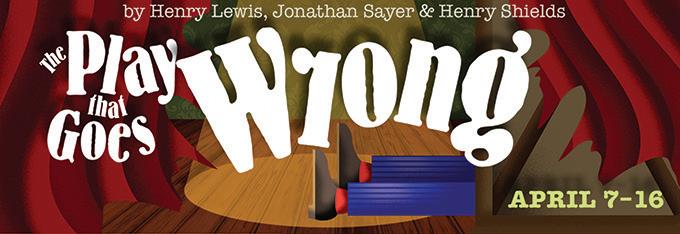
TheBirdWhoMadeMilk

April 29
All Ears Theatre
An African folk tale adapted by local writers Arnold Johnston and Deborah Ann Percy is brought to life in this all-audio theater production directed by Sid Ellis. The radio play tells of a mother, her bullying husband, and their two children who find their lives changed by the intervention of a magic bird that brings out the worst in the father.
Show time for this free production is 6 p.m. at the Kalamazoo Nonprofit Advocacy Coalition, 315 W. Michigan Ave. For information, visit allearstheatre.org.
In this musical for children, 8-year-old Lily Polkadot has recently moved to the “Squares Only” town of Rockaway. Being the first Polkadot in her school, Lily faces daily bullying and segregated drinking fountains. It seems impossible for her to gain peer acceptance — until she meets Sky, a Square boy who is curious about her polkadot skin and becomes her friend.

Polkadots serves as a history lesson for children, since it was inspired by the experiences of the Little Rock Nine, a group of nine African American students who were prevented from attending a racially segregated high school by the governor of Arkansas in the 1950s.
Show times are 7:30 p.m. April 21 & 28, 1 and 4 p.m. April 22 & 29, and 2 p.m.
and available by calling 343-1313 or visiting kazoocivic.com.
April 23 &
in
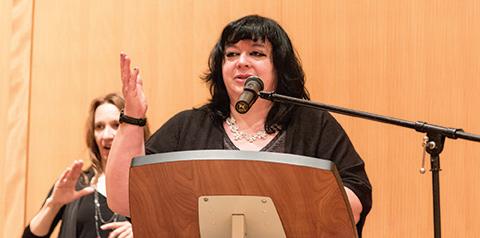
Pulitzer Prize-winning Kalamazoo poet Diane Seuss will be one of the celebrated writers at the 10th Kalamazoo Poetry Festival, which will be held in person and online and have the theme “The Garden.”
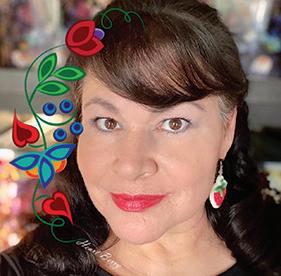
Seuss will host a Celebration of Community Poets at 6 p.m. April 14. That will be followed by a Your Turn Open Mic event at 8 p.m.
Other featured poets will be Hala Alyan, Kaveh Akbar and Traci Brimhall. They will read their poetry at the festival finale, which starts at 6 p.m. April 15.
Workshops will be offered at 6:30 p.m. April 13 and 10 a.m. and noon April 15.

The festival is being held during National Poetry Month and is free. To register or for more information, visit kalamazoopoetryfestival.com.
April 3 & 4
Kalamazoo illustrator David Small and author Kristen Tracy will talk about creating children's books, including their new book, Cat’s Very Good Day, at two events this month.
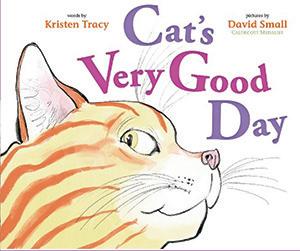
Their children's picture book, which chronicles a mischievous cat’s action-packed day, was released this month by Penguin Random House.
Tracy and Small will give a presentation and do a book signing at 6:30 p.m. April 3 at Western Michigan University’s Zhang Legacy Collections Center, 1650 Oakland Drive, and at 6:30 p.m. April 4 at this is a bookstore, 3017 Oakland Drive. Registration is requested for the bookstore event; you can go to Eventbrite.com/Bookbug-this is a bookstore to register.
Several authors will discuss their books at events across the area this month:
Angeline Boulley, who writes about the Ojibwe (Chippewa) community in Michigan's Upper Peninsula, will discuss and read from her debut young adult and New York Times bestselling novel, Firekeeper’s Daughter, on April 4 at Kalamazoo Valley Community College’s Texas Township campus. Boulley will present a craft talk at 10 a.m. and a reading at 2:15 p.m. in the college's Student Commons Theater, Room 4240. For information, go to kvcc.edu/visitingwriters.
Spiritual writer, poet and philosopher Mark Nepo will read from his book of poems The Half-Life of Angels at 7 p.m. April 13 at the Kalamazoo College Upjohn Library, followed by a discussion and book signing. For information, visit kzoo.edu/ news/calendar-of-events.
Anne Dueweke will discuss her 2022 book, A Conversation & Reckoning: K College Uncovers Its Racial & Colonial Past, at 6:30 April 25 at the Kalamazoo Public Library's Oshtemo Branch. Dueweke will be joined by Donna Odom, the former executive director of the Society for History and Racial Equity (SHARE). For information, visit kpl.gov.
Silke Maria Weineck and Stefan Szymanski, who penned City of Champions: A History of Triumph and Defeat in Detroit, will discuss their book at 7 p.m. April 26 at the Richland Community Library. The book tells of the changing fortunes of Detroit told through the lens of major sports stories. For information, visit richlandlibrary.org.
Throughout the month
Various venues
Western Michigan University’s School of Music will present several ensembles and showcase its student talent in various performances this month. These events will be in the university’s Dalton Center Recital Hall and, unless otherwise noted, are free. The performances scheduled are:
• WMU Trombone Choir, 7:30 p.m. April 3.
• University Jazz Lab Band, 7:30 p.m. April 4.
• Chromic Duo, 7:30 p.m. April 5, with pre-concert talk at 7 p.m. Tickets are $5–$15.
• David Berkman, jazz pianist, 7:30 p.m. April 5, Dalton Center Leture Hall.

• Gold Company II, WMU’s vocal jazz ensemble, 7:30 p.m. April 6.
• Brent Miller, composer, 5 p.m. April 7.
• Birds on a Wire, WMU’s new-music ensemble, 1 p.m. April 8.
• University Percussion Ensemble, 7:30 p.m. April 8.
• University Wind Symphony, with guest composer David Biedenbender, 7:30 p.m. April 13, Miller Auditorium.
• University Symphonic & Concert Bands, 3 p.m. April 16, Miller Auditorium.
• Amphion, Anima & University Chorale, three university choirs, 5 p.m. April 16.
• Chamber Music Ensembles Student Showcase, 7:30 p.m. April 17 & 18.
• Campus Choir, 7:30 p.m. April 19.
• University Symphony Orchestra, 3 p.m. April 23, Miller Auditorium. For information or to purchase tickets, visit wmich.edu/music/events.
April 28
WMU’s Dalton Center
Recital Hall
Fontana Chamber Arts presents this ensemble, performing works by Brahms, at 7:30 p.m.
The Chamber Music Society of Lincoln Center has an evolving and impressive roster of musicians and is one of 11 constituents of the largest performing arts complex in the world, the Lincoln Center for the Performing Arts, which offers performance, education, recording and broadcasting activities.
Tickets are $15–$30 and available at fontanamusic.org.
Throughout the month
Various venues
From Brahms to Broadway, the Kalamazoo Symphony Orchestra offers three programs this month geared for music lovers of all ages:

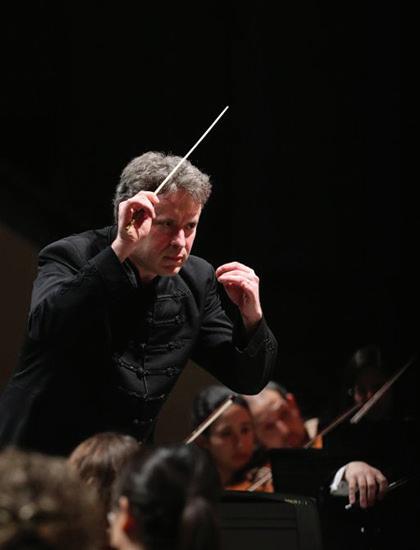
A German Requiem — The Bach Festival Chorus will join the full symphony to perform this Brahms requiem to hope, courage and joy at 7:30 p.m. April 15 at Chenery Auditorium. The program will also include music by Beethoven and Mozart.
Family Discovery Concert — A concerto performance by the KSO's Jane Rooks Ross and Barry Ross Youth Soloist Competition winner will be one highlight of this familyfriendly concert at 3 p.m. April 22 at Chenery Auditorium. The concert will be preceded by lobby performances by youth musicians, hands-on exploratory activities, and information on getting started with area music programs.
Afternoon on Broadway — The Chamber Players of the KSO plus four singers and pianist Christopher Gray will perform songs from Broadway shows such as Les Misérables, South Pacific, City of Angels, My Fair Lady and Into the Woods on April 30 at Western Michigan University’s Dalton Center Recital Hall. Kathy Mulay will direct the concert, and the featured singers will be Rhea Olivacce, Sandra Bremer, Ben Gulley and Jeremy Koch.
Tickets for each of these performances can be purchased at kalamazoosymphony.com, with discounts available for teachers, veterans, students and low-income individuals.
April 29
Kalamazoo Concert Band
In its final concert this season, the Kalamazoo Concert Band will be joined by the winner of its 2023 Youth Soloist Competition for high school wind and percussion players.
They will perform a program of music focused on travel at 7:30 p.m. in Chenery Auditorium, 714 S. Westnedge Ave.
The concert is free. For information, visit kalamazooconcertband.org.
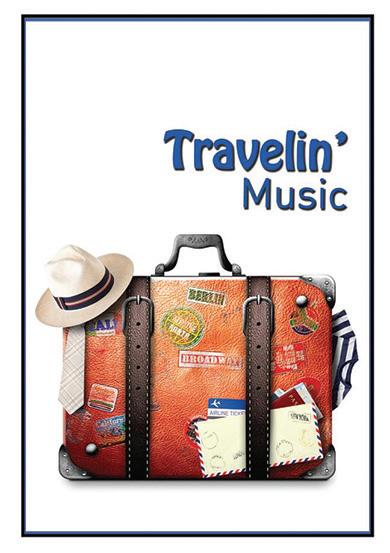

April 19
Dormouse Theatre
April 23
Kalamazoo Community Chorale


For the first time since 2018, members of the Earthwork Music Collective will bring their tour to Michigan’s Lower Peninsula, including this stop in Kalamazoo.
Among the musicians who will perform are Dede & the Dreamers, Seth Bernard, Samantha Cooper, Chris Good, Jordan Hamilton, Audra Kubat, Elisabeth PixleyFink, Hearth & Hymn, Jo Serrapere and Nicholas James Thomasma.
Show time is 6 p.m. Tickets are $30 and available at dormousetheatre.com.
April 23
Kalamazoo Singers
This chorus will perform music about memories and looking to the future at 3 p.m. at First Congregational Church, 345 W. Michigan Ave.
The concert is the second to focus on this season’s theme, Songs for the Journey. The first concert, in November, focused on moving from grief to healing.
Tickets are $5–$15 and available at kalamazoosingers.org.
The Kalamazoo Community Chorale teams up with the Kalamazoo Mandolin & Guitar Orchestra for its annual spring concert, a free event set for 3 p.m. at First United Methodist Church, 212 S. Park St.
The chorale is a 55-member women's chorus, and the orchestra is a plucked string ensemble of mandolins, mandolas, mandocellos, guitars and bass.
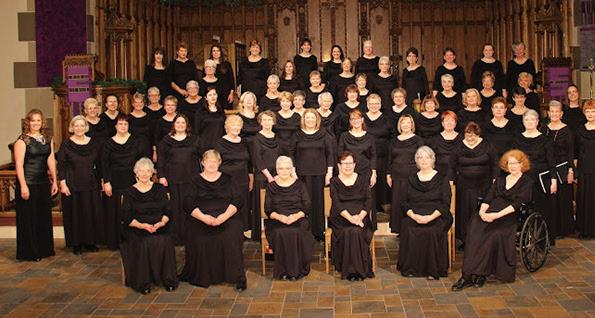
For more information, visit kalamazoocommunitychorale.com.
April 30
Kalamazoo Junior Symphony Orchestra
Vocalists from several local choruses will join the KJSO in this performance at 4 p.m. at Chenery Auditorium.
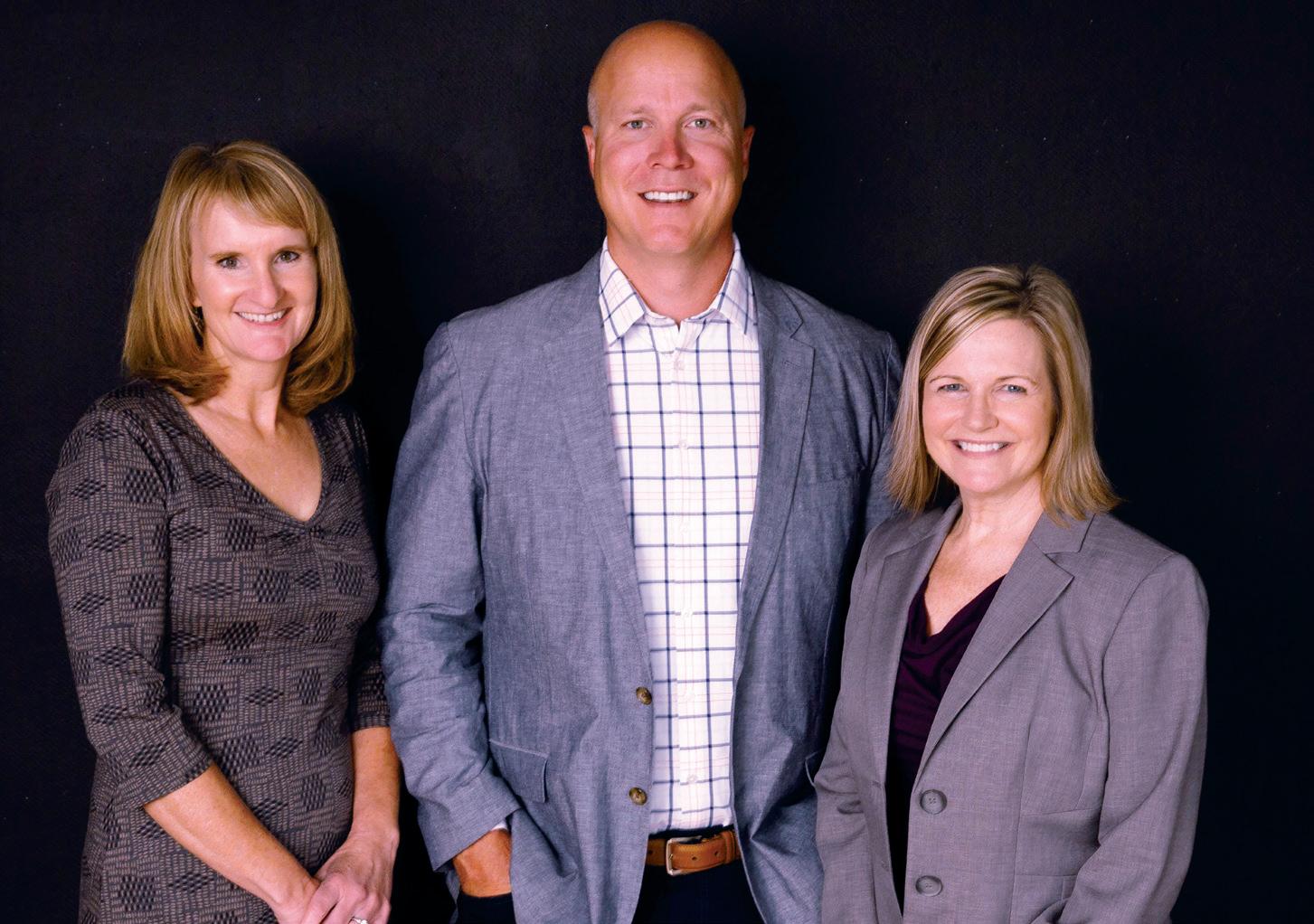
The youth symphony will join forces with singers from Vicksburg and Three Rivers high schools, First Congregational Church, First Presbyterian Church and Kalamazoo College in a program featuring works by Charles-Auguste de Bériot, Alan Hovhaness, Giuseppe Verdi, Brahms, and John Williams. The program will reflect on transitions and be a celebration of longtime KJSO Executive Director Lee Fletcher, who is retiring after nearly four decades at the organization.
Violinist Tyler Jacobs, winner of the 2022 KJSO Concerto Competition, will also perform.
Tickets are $5–$15 and available at kjso.org.
April
Bravo!, a competition and performance celebrating local youth musicians, returns this month after a seven-year hiatus.
Local youth musicians from all musical disciplines were invited to audition for the program. Winners of those auditions will give a free recital at 7 p.m. April 19 in the Judy K. Jolliffe Theatre in the Epic Center, 359 S. Kalamazoo Mall. Winners also receive professional coaching sessions prior to the recital, tickets to The Gilmore, Fontana Chamber Arts and the Kalamazoo Symphony Orchestra performances, and gift cards to local businesses.
Portions of the recital will be recorded for broadcast at a later date on Classical WMUK 89.9 and the Public Media Network.
Bravo! was originally created in 2001 to showcase local youth musicians; the last event was held in 2016.

For information, visit https://www.fontanamusic.org/bravo.


April 24–May 21
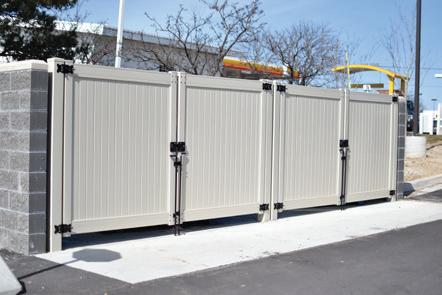

Kalamazoo Institute of Arts
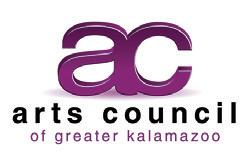

Showcasing artwork made by local high school students, the High School Area Show has been a tradition for over 40 years at the KIA. Works by students in Allegan, Berrien, Barry, Branch, Calhoun, Cass, Kalamazoo, St. Joseph and Van Buren counties will be displayed, with the student artists eligible for more than 45 scholarships and prizes that will be awarded.
The KIA is open 11 a.m.–5 p.m. Wednesday–Saturday and noon–4 p.m. Sunday. Admission is $5, or $2 for students and free for members. For information, visit kiarts.org.


April 1
Kalamazoo Book Arts Center
After being a virtual event last year, the Edible Book Festival returns to being a live event beginning at 2:30 p.m. at the Kalamazoo Book Arts Center, 326 W. Kalamazoo Ave, Suite 103A.
In this popular annual culinary celebration of the book arts, the competitors create food items inspired by their favorite books. The display begins at 2:30, and winners will be announced at 4 p.m., followed by an opportunity for attendees to eat the entries. For information, visit kalbookarts.org.

April 7–May 5
Kalamazoo Book Arts Center
Two artists will be featured this month at the KBAC Gallery.
Prints and other artwork by John McKaig explore escape, sexuality, mortality, passage after life and dealing with trauma.
Works created by Caroline Allen and inspired by the writing of Kia Penso will be featured in Caroline Allen: Paper Collage . Allen’s collages are being used to design multi-colored linocuts for the KBAC letterpress publication The Ghosts, a limitededition book of short stories by Penso.
The opening reception for both exhibitions will be 6–7 p.m. April 22, followed by readings by poet W. Todd Kaneko and author Kia Penso from 7–8:30 p.m.
For information, visit kalbookarts.org.

April 29–June 15
Westminster Art Festival
Visual art and poetry representing the complicated and intertwined relationships in and among ecosystems will be the focus of this annual exhibition.
The juried festival, which is held at Westminster Presbyterian Church, 1515 Helen Ave., will kick off with an opening reception and concert from 5–8 p.m. April 29. Awards for the festival will be presented at 6 p.m. May 13, with the exhibition open from 5–8 that night.

For information, call 344-3966 or visit westminsterartfestival.org.
Kalamazoo Institute of Arts
YoungArtistsofKalamazooCounty through April 16
Art,MusicandFeminisminthe1950s , through May 7
ExpressionsinPaperandClay , through May 14

LinesThat..., through June 11
WMU’s Richmond Center for Visual Arts
Naomi van Niekerk:Interval , through April 21
Annual Frostic School ofArt Student Exhibition , through April 21
Portage District Library
AWeaver’sJournalofEndangered Wildflowers , by Carol Irving, through April 22
Le Petite Bookshelf , by Michele Boudreaux, through April 22

The Play That Goes Wrong — A 1920s whodunit in which everything goes wrong, 7:30 p.m. April 7–8, 13–15, 2 p.m. April 16, Shaw Theatre, WMU, 387-6222, wmich.edu/theatre.
What to Send Up When It Goes Down — Vignettes build to climactic moments about the absurdity of antiBlackness in society, 7:30 p.m. April 14 & 15, 2:30 p.m. April 16, Face Off Theatre Company, Epic Center, 359 S. Kalamazoo Mall, faceofftheatre.com.
Chicken & Biscuits — Non-stop drama as rival sisters bury their father, 7:30 p.m. April 20–22, 27–29 & May 4–6; 2 p.m. April 23, 30 & May 7; Farmers Alley Theatre, 221 Farmers Alley, 343-2727, farmersalleytheatre.com.
Musicals
Polkadots — Lily Polkadot's experiences after moving to the “Squares Only” town of Rockaway, 7:30 p.m. April 21 & 28, 1 p.m. April 22 & 29 (ASL & sensory-friendly), 4 p.m. April 22 & 29, 2 p.m. April 23 & 30, Parish Theatre, 405 W. Lovell St., 343–1313, kazoocivic.com.
Other
The Bird Who Made Milk — All-audio theater production written by Deborah Percy & Arnold Johnston & directed by Sidney Ellis, 6 p.m. April 29, KNAC building, 315 W. Michigan, allearstheatre.org.
Bands & Solo Artists
Boomerang Concert — Jake Blount, Laurel Premo & Nic Gareiss perform, 6 p.m. April 1, Lake Auditorium, Kalamazoo Valley Community College, Texas Township; pre-concert talk 5 p.m.; kalamazoomuseum.org.
Bell’s Eccentric Cafe Concerts — Brenna, Yolanda Lavender, Veronica Eileen & more, April 1; Garcia Peoples & Chris Forsyth, April 6; Roger Clyne & The Peacemakers, April 7; King Buffalo w/Sisters of Your Sunshine Vapor, April 22; Passafire, The Quasi Kings & Crooked Coast, April 23; Over the Rhine, April 27; Texas Hill, April 29; all shows begin at 8 p.m., 355 E. Kalamazoo Ave., 382–2332, bellsbeer.com.
Snarky Puppy — Jazz/fusion band, 8 p.m. April 2, State Theatre, 404 S. Burdick St., kazoostate.com.
Wiz Khalifa — With Joey Bada$$, Berner, Smoke DZA & Chevy Woods, 8 p.m. April 15, Wings Event Center, 3600 Vanrick Drive, wingseventcenter.com/events.
Earthwork Collective Spring Tour — Earthwork Music Collective artists perform, 6 p.m. April 19, Dormouse Theatre, 1030 Portage St., mfsm.us.
Schlitz Creek Bluegrass Band — Bluegrass music, 2–4 p.m. April 23, Portage District Library, portagelibrary.info.
Orchestra, Chamber, Jazz, Vocal & More
WMU Trombone Choir — 7:30 p.m. April 3, Dalton Center Recital Hall, WMU, 387-4678, wmich.edu/music/ events.
University Jazz Lab Band — 7:30 p.m. April 4, Dalton Center Recital Hall, wmich.edu/music/events.
KSO Spring Craft Music — Kalamazoo Symphony musicians perform, 7 p.m. April 5, Bell’s Eccentric Cafe, 382–2332, kalamazoosymphony.org.
Our Planet Live In Concert — With narration, HD cinematography & orchestra, 7 p.m. April 5, Miller Auditorium, millerauditorium.com.
Chromic Duo — Toy piano, electronics & multimedia, 7:30 p.m. April 5, Dalton Center Recital Hall, pre-concert talk 7 p.m.; wmich.edu/music/events.
David Berkman — Jazz pianist, 7:30 p.m. April 5, Dalton Center Lecture Hall, WMU, wmich.edu/music/events.
Gold Company II — Student vocal jazz group, 7:30 p.m. April 6, Dalton Center Recital Hall, 387-4678, wmich. edu/music/events.
Brent Miller — Composer, 5 p.m. April 7, Dalton Center Recital Hall, wmich.edu/music/events.
Birds on a Wire — New-music ensemble, 1 p.m. April 8, Dalton Center Recital Hall, wmich.edu/music/events.
University Percussion Ensemble — 7:30 p.m. April 8, Dalton Center Recital Hall, 387-4678, wmich.edu/music/ events.
University Wind Symphony — 7:30 p.m. April 13, Miller Auditorium, wmich.edu/music/events.
Brahms: A Requiem to Hope — KSO & Kalamazoo Bach Festival Chorus join forces, 7:30 p.m. April 15, Chenery Auditorium, kalamazoosymphony.com.
University Symphonic & Concert Bands — 3 p.m. April 16, Miller Auditorium, wmich.edu/music/events.
Choral Showcase — WMU choirs Amphion, Anima & University Chorale, 5 p.m. April 16, Dalton Recital Hall, wmich.edu/music/events.
Chamber Music Ensembles Student Showcase — 7:30 p.m. April 17, Dalton Center Recital Hall, wmich. edu/music/events.
Campus Choir — 7:30 p.m. April 19, Dalton Center Recital Hall, WMU, 387-4678, wmich.edu/music/events.
Family Discovery! — KSO's family-friendly performance, 3 p.m. April 22, Chenery Auditorium, 714 S. Westnedge Ave., kalamazoosymphony.org.
University Symphony Orchestra — Annual Concerto Concert, 3 p.m. April 23, Miller Auditorium, wmich.edu/ music/events.
Spring Concert: Connected — Kalamazoo Community Chorale performs with the Kalamazoo Mandolin & Guitar Orchestra, 3 p.m. April 23, First United Methodist Church, 212 S. Park St., kalamazoocommunitychorale.com.
Songs for the Journey, Part 2 — The Kalamazoo Singers perform, 3 p.m. April 23, First Congregational Church, 345 W. Michigan Ave., kalamazoosingers.org.
Chamber Music Society of Lincoln Center — Presented by Fontana Chamber Arts, 7:30 p.m. April 28, Dalton Center Recital Hall, fontanamusic.org.
Travelin’ Music — Kalamazoo Concert Band’s 2023 Youth Soloist Competition winner performs with the band, 7:30–9 p.m. April 29, Chenery Auditorium, kalamazooconcertband.org.
Afternoon on Broadway — KSO Chamber Players & 4 singers perform Broadway tunes, 3 p.m. April 30, Dalton Center Recital Hall, kalamazoosymphony.org.
Meditations on Fate — Kalamazoo Junior Symphony Orchestra with vocalists from local high schools, churches & Kalamazoo College, 4 p.m. April 30, Chenery Auditorium, 349-7557, kjso.org.
COMEDY
Bored Teachers: We Can’t Make This Stuff Up — Comedy about teaching, 7 p.m. April 13, State Theatre, 404 S. Burdick St., kazoostate.com.
Chelsea Handler — Comedian, 7:30 p.m. April 15, 7 p.m. April 16, State Theatre, kazoostate.com.
Joe Gatto — Comedian, 7 p.m. April 21, Miller Auditorium, millerauditorium.com.
Nate Bargatze — Comedian, 7 & 9:30 p.m. April 28, State Theatre, kazoostate.com.
Kalamazoo Institute of Arts
314 S. Park St., 349-7775, kiarts.org
Exhibitions
YoungArtistsofKalamazooCounty— Works by youth from Kalamazoo County schools, through April 16.
Art,Music&Feminisminthe1950s— Women artists during this period of change, through May 7.
Expressions in Paper & Clay — Traditions of Japanese printmaking & ceramics in the last 50 years, through May 14.
Lines That … — The versatility of a line, inspired by Joe Overstreet’s Boxes exhibition, through June 11.
UnveilingAmericanGenius— Abstract & contemporary works emphasizing stories told by African-American, Latino & other artists, through Dec. 31.
High School Area Show — Works by youth from Southwest Michigan, April 24–May 21.
Events
Miss Representation — Film on how media & culture contribute to the underrepresentation of women in positions of power, 1–3 p.m. April 1.
Kirk Newman Art School Residents: Part II — KIA residency students share their experiences, noon–1 p.m. April 4, in-person & online event; register on KIA website.
SallySextonKalmbach — Chicago historian who gives walking tours of her hometown, 10–11 a.m. April 12, online; to register, email artleaguekalamazoo.org.
Wikipedia Edit-a-Thon — Use KIA library resources to add information to underrepresented female artists on Wikipedia, 1–3 p.m. April 16.
Kirk Newman Art School Residents: Part III — KIA residency students share their experiences, noon–1 p.m. April 18, in-person & online event; register on KIA website.
Fierce Poise: Helen Frankenthaler & 1950s New York — Discussion of Alexander Nemerov's book, 2–3 p.m. April 19.
Kazoo 48-Hour Film Festival Screening — Local filmmakers and the films they created in 48 hours, 6–8 p.m. April 20.
Girls in 1950s Media — How films portrayed teenage girls in the 1950s, noon–1 p.m. April 25, in-person & online event; register on KIA website.
Richmond Center for Visual Arts
Western Michigan University, 387-2436, wmich.edu/art
Annual Student Exhibition — Works by WMU Frostic School of Art students, through April 21, Albertine Monroe-Brown Gallery.
Naomi van Niekerk: Interval — Prints, objects & short films by van Niekerk, through April 21, Netzorg & Kerr Gallery.
Other Venues
A Weaver’s Journal of Endangered Wildflowers — Weavings by Carol Irving, through April 22, Portage District Library, 300 Library Lane, 329-4544, portagelibrary.info.
Le Petite Bookshelf — Mixed-media works by Michele Boudreaux, through April 22, Cafe Gallery, Portage District Library, portagelibrary.info.
Edible Book Festival — Celebrating the art of the book, begins 2:30 p.m. April 1; winners announced 4 p.m.; eating begins at 4:05 p.m.; Kalamazoo Book Arts Center, 326 W. Kalamazoo Ave, Suite 103A, 373-4938, kalbookarts.org.
John McKaig — Prints & other artwork by McKaig, April 7–May 5, Kalamazoo Book Arts Center; reception 6–7 p.m. April 22, followed by readings by poet W.
Todd Kaneko & author Kia Penso, 7–8:30 p.m. April 22, kalbookarts.org.
CarolineAllen:PaperCollage— Works inspired by Kia Penso's short stories, April 7–May 5, Kalamazoo Book Arts Center; reception & reading as noted in previous listing, kalbookarts.org.
Westminster Art Festival: EcoWisdom — Exhibition of visual art & poetry, April 29-May 13, Westminster Presbyterian Church, 1515 Helen Ave., Portage; opening event, awards & concert 5–8 p.m. April 29, westminsterartfestival.org.

Comstock Township Library 6130 King Highway, 345-0136, comstocklibrary.org
Writing with Wilma — A 6-week writing class with Wilma Kahn, 10–11 a.m. Tuesdays, through April 11; registration required.
Adult Book Club — Discussion of Octavia Butler's Parable of the Sower, 1:30–2:30 p.m. April 13.
Kalamazoo Public Library 553-7800, kpl.gov
Transformative Change at the Intersection of Gender, Race, & Sexuality — A 3-part online series, 10 a.m.–1 p.m. March 27, April 3 & 10; registration required.
Page Turners Book Club — Discussion of Kevin Wilson's Now Is Not the Time to Panic, 6:30–7:30 p.m. April 3, Oshtemo Branch, 7265 W. Main St.; registration required.
Kate Beaton — Talk by bestselling cartoonist of Hark! A Vagrant! & Ducks: Two Years in the Oil Sands, 7-8 p.m. April 4, online; registration required.
Rose Street Poetry Club — Poetry reading & writing session for adults, 10–11 a.m. April 8, Central Library, 315 S. Rose St.
Music & Memories — Caitlyn Bodine on songs for older adults & how music stirs memories, 10:45–noon April 10, Oshtemo Branch.
GLAMA Acoustic Slow Jam — Great Lakes Acoustic Music Association members lead a jam for acoustic stringed instruments, 5:30–7:30 p.m. April 11 & 18, Van Deusen Room, Central Library, 315 S. Rose St.

Intermediate Anti-Racist Primer for Institutions — A 4-part online series, 11 a.m.–2 p.m. April 13 & 20, May 11 & 18; registration required.
Ask a Lawyer Family Law Clinic — A private session with an attorney on common family legal questions, 3–5 p.m. April 13, 10 a.m.–noon April 26, Central Library, registration required.
Drink the Wild: Recipes from a Kitchen Witch for the Spirited & Sober Soul — Angie Jackson’s nonalcoholic elixirs, 6:30–7:30 p.m. April 17, Oshtemo Branch; registration required.
GLAMA Community Sing — 6–7:30 p.m. April 18, Van Deusen Room, Central Library.
Dungeons & Dragons Game Night — Beginner & experienced tables, 5:30–7:30 p.m. April 19, Washington Square Branch, 1244 Portage St.; registration required.
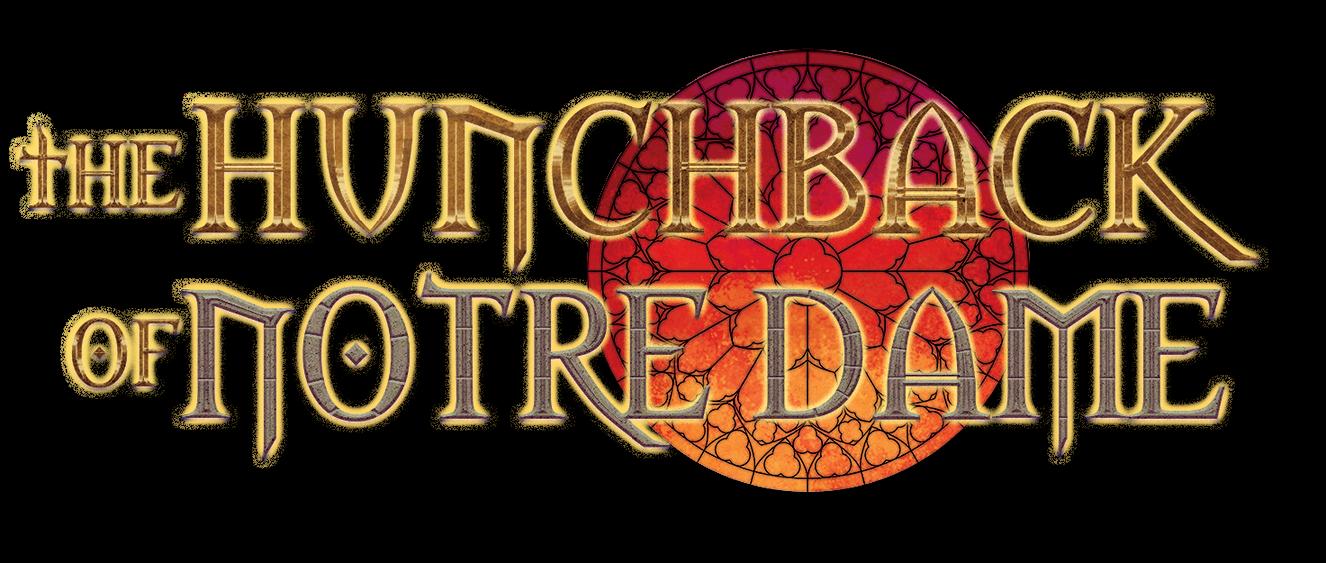
Classics Revisited — Discussion of Octavia Butler's Parable of the Sower, 2:30–4 p.m. April 20, Boardroom, Central Library; Zoom option available.
Gardening with the Cowardly Gardener — Gardening tips, seed/seedling giveaways & gardening tools for check-out, noon–2 p.m. April 22, Eastwood Branch, 1112 Gayle.
Jazz & Sweet Potato Pie — Faith Quashie performs jazz, with sweet potato pie served, 6:30–7:30 p.m. April 25, Douglass Community Room, Alma Powell Branch, 1000 W. Paterson St.

Reckoning: Kalamazoo College Uncovers Its Racial & Colonial Past — Talk by author Anne Dueweke &
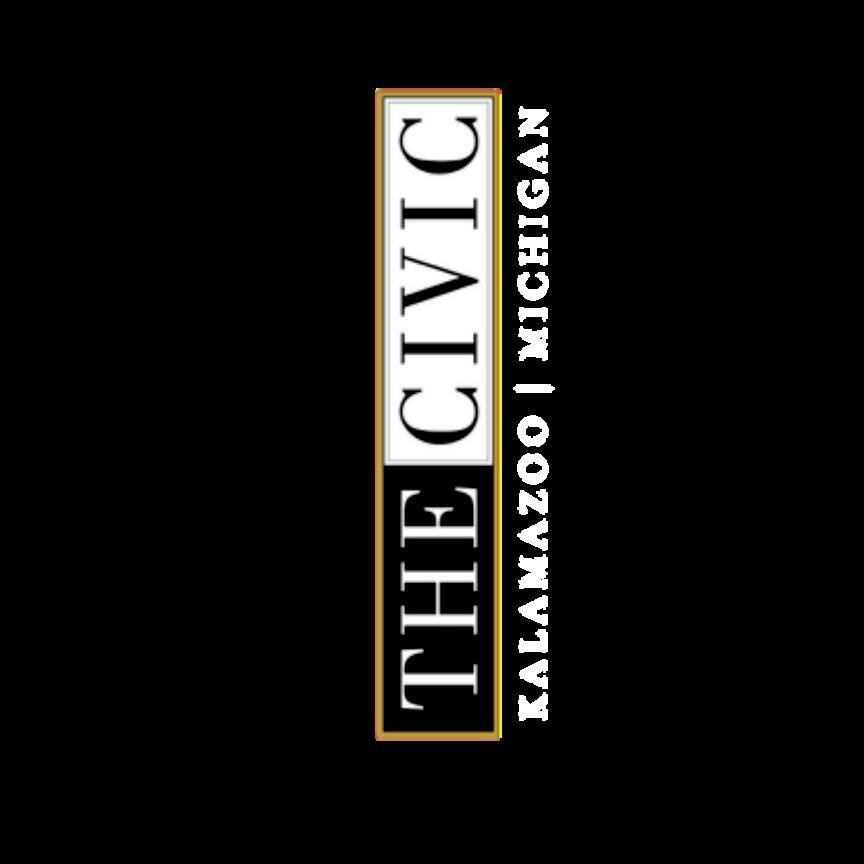
former SHARE Director Donna Odom, 6:30–7:30 p.m. April 25, Oshtemo Branch.
William Kent Krueger — Meet the author of Ordinary Grace, 8–9 p.m. April 27, online; registration required.
Parchment Community Library
401 S. Riverview Drive, 343-7747, parchmentlibrary.org

Big Furry Friends — Therapy dogs, 4:30–6:30 p.m. April 4, 11, 18, 25.
Parchment Book Group — Discussion of Kai Harris's What the Fireflies Knew, 6 p.m. April 10.
Mystery Book Club — Discussion of Maris Soule's The Crows, 6:30 p.m. April 18.
Yum’s the Word: Chocolate Explorations — Confections with Convictions' Dale Anderson speaks, 6:30–7:30 p.m. April 26; registration required.
Tidy Up & Spark Joy! — Organization ideas with Shannon Honeycutt, 6 p.m. April 27; registration required.
Portage District Library
300 Library Lane, 329-4544, portagelibrary.info
Friends of the Library Book Sale — 9 a.m.–3 p.m. April 1.
Spring Cleaning Boot Camp — Spring cleaning talk by The Organizer Man Dan Cunningham, 7–8 p.m. April 4; registration required.
Muffins & the Market — Warren Fritz on stock market trends, 9 a.m. April 6 & 20.
Saturday Sound Immersion — Wind Willow Consortium provides a relaxing, well-being experience, 10 a.m. April 8; registration required.
Test of Time: True or False Edition — A history quiz on common household items, 10:30 a.m.–12:30 p.m. April 8.
Lil’ Abner — Viewing of the 1959 movie, 2–4:30 p.m. April 8.
Plots & Pages: A Local Writers Group — Author Mark Love on the craft of writing, 6:30 p.m. April 10.
Pub(lic) Library Trivia — Pub-style trivia, 7–8 p.m. April 11; registration required.
International Mystery Book Club — Discussion of Femi Kayode's Lightseekers, 7 p.m. April 13.
Documentary & Donuts — Viewing of The Garden: Fighting for an L.A. Urban Garden, 10 a.m.–noon April 14.
Kalamazoo Macintosh Users Group — Help with Macintosh programs & accessories, 9 a.m.–noon April 15.
Kalamazoo Valley Genealogical Society — Information on genealogy, 6:30–8:30 p.m. April 17.
Open for Discussion — Discussion of Louise Erdrich's The Sentence, 10:30 a.m. April 18.
All About Our Seed Library — Information on PDL’s seed library, 12:30 p.m. April 19; registration required.
Cookies & Conversation: Heartwarming Reads Book Club — Discussion of Viola Shipman's The Heirloom Garden, 2 p.m. April 19.
How to Write a Novel — Mark Love discusses fiction writing, 6:30 p.m. April 19.
The History of the Portage Pfizer Site & The Upjohn Company — Talk by Jeremy Winkworth, Pfizer retiree & memorabilia collector, 7 p.m. April 20.
Yoga & Journaling — A slow-flow yoga class with writing prompts, 1:30–3 p.m. April 21; registration required.
Michigan’s Endangered Wildflowers — Meet fiber artist Carol Irving, 11 a.m.–noon April 22.
Book Tasting — Librarians talk about what they're reading, 11 a.m.–1 p.m. April 26.
Kalamazoo Area Wild Ones: Growing Wildflowers from Seed — A program on environmentally friendly landscaping, 7 p.m. April 26.
Kalamazoo Plant It Forward April Swap — Indoor & outdoor plant swap, 10 a.m.–noon April 29; registration required.
Richland Community Library 8951 Park St., 629-9085, richlandlibrary.org
Bridge Club — Noon Tuesdays.
Adult Art Club — Painting with tissue paper, 6–7 p.m. April 4; registration required.
Team Game Night — Teams of 2–4 people play Family Feud, 6 p.m. April 11; registration required.

RCL Film Club — Discussion of The Public, 7 p.m. April 13.
Richland Genealogy Group — Roundtable discussion, 10–11:30 a.m. April 20, in-person & via Zoom.
Books with Friends — Discussion of Lucy Foley's The Paris Apartment, 7 p.m. April 20, in-person & via Zoom.
Richland Area Writer’s Group — 10–11:30 a.m. April 22, in-person & via Zoom.
City of Champions: A History of Triumph & Defeat in Detroit Meet authors Silke Maria Weineck & Stefan Szymanski, 7 p.m. April 26.
Team Trivia — Teams of 2–6 people test their knowledge, 7 p.m. April 27; registration required.
Other Venues
David Small & Kristen Tracy — Discussing their book, Cat’s Very Good Day, followed by a book signing; 6:30 p.m. April 3, WMU’s Zhang Legacy Collection Center,
1650 Oakland Drive; 6:30 p.m. April 4, this is a bookstore, 3017 Oakland Drive; registration requested at Eventbrite. com/Bookbug-this is a bookstore.
Visiting Writers Series — Author Angeline Boulley reads from Firekeeper’s Daughter, 10 a.m. craft talk, 2:15 p.m. reading, April 4, KVCC Student Commons Theater, Room 4240, Texas Township, libguides.kvcc.edu/ visitingwriters.
Kalamazoo Poetry Festival — Workshops, readings, community poets & an open-mic event, April 13–15, First Congregational Church, 345 W. Michigan Ave., kalamazoopoetryfestival.com.
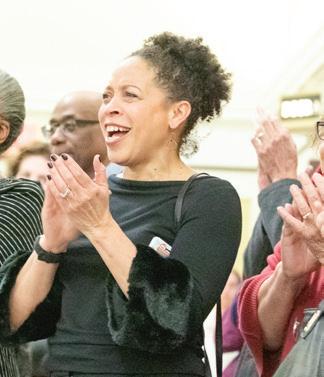
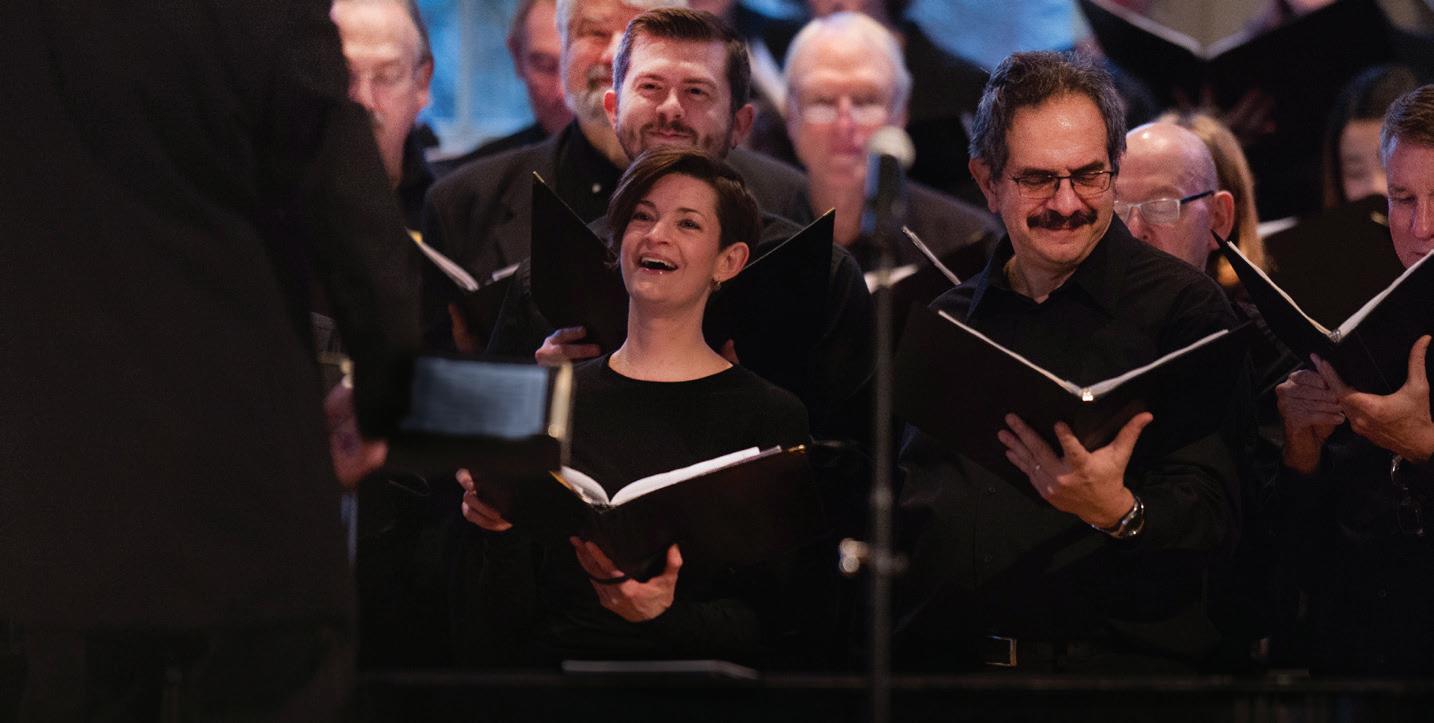
Mark Nepo — Reading from his book The Half-Life of Angels, followed by a book signing, 7 p.m. April 13, Upjohn Library, Kalamazoo College, kzoo.edu/news/ calendar-of-events.
Gilmore Car Museum
6865 Hickory Road, Hickory Corners, 671-5089, gilmorecarmuseum.org
2023 Lecture Series — The Rich History of the Grand Hotel, Mackinac Island, April 2; America’s First Road Trip, April 16; Strange, Unusual, Unique & Crazy Highway Signs, April 23; all sessions begin at 2 p.m.
Kalamazoo Valley Museum
230 N. Rose St., 373-7990, kalamazoomuseum.org
Moments in Time: The Kalamazoo County Photo Documentary Project — Life in photos of Kalamazoo since 1984, through June 4.
Mental Health: Mind Matters — Exploring mental health and mental illness, through June 18.
Wonder Media: Ask the Questions! — How to spot misinformation & disinformation in the media, through 2023.
Crawlspace Comedy — Family-friendly entertainment, 1-2 p.m. & 2:30-3:30 p.m. April 1.
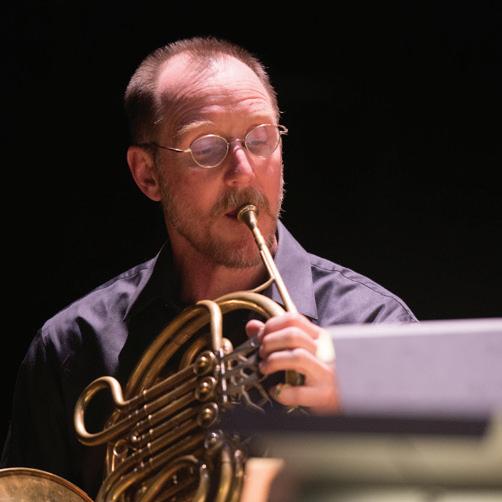
NATURE
Kalamazoo Nature Center
7000 N. Westnedge Ave., 381-1574, naturecenter.org
Raccoon Run & Earth Day 5K — 9 a.m. & 10 a.m. April 15; registration required.
Earth Day Celebration — Free admission to the Visitor Center & trails, plus activities, April 22.
Kellogg Bird Sanctuary
12685 East C Ave., Augusta, 671-2510, birdsanctuary@kbs.msu.edu
Poetry on the Trail — Read poems along the trails, 9 a.m.–5p.m.
Birds & Coffee Chat Online — Bird-friendly native plants, 10 a.m. April 12; registration required.
Other Venues
Geo Mystery Tours — Self-guided tour using GPS on rocks found in Portage, April 1–30, portagemi.gov/ calendar; registration required.
Weekly Kal-Haven Trail Birding Walk — Walk to a bird marsh, 9–11 a.m. Tuesdays, beginning April 4; meet at caboose trailhead on 10th Street, kalamazooaudubon.org.
Friday Frog Foray — Walk & see amphibians in Gourdneck State Game Area with a DNR scientist, 6:45–8 p.m. April 7, meet at Angling Road parking lot; registration required, portagemi.gov/calendar.
Kalamazoo Astronomical Society Meeting — Kyle Cudworth presents Tales & Tails of Star Clusters, 7–9:15 p.m. April 14, Kalamazoo Area Math & Science Center, 600 W. Vine St.; register for in-person or online viewing at kasonline.org.
Kalamazoo Astronomical Society Public Observing Session — Venus & Galaxies of the Virgo Cluster, April 15; The Moon, Venus, & Double Stars of Spring, April
29; 8 p.m.–midnight, Kalamazoo Nature Center, 7000 N. Westnedge Ave.; register at kasonline.org.
Kalamazoo Earth Day 2023 Celebration — Celebration in Kalamazoo's Edison, Oakwood & Vine neighborhoods with activities, music & food, 11 a.m.–7 p.m. April 22; transportation to Kalamazoo Nature Center, with guided hikes, naturecenter.org/programs/earthday.
Audubon Society of Kalamazoo — Discussion of Paw Paw River Prothonotary Warbler Nest Box Program, 7:30 p.m. April 24, People’s Church, 1758 N. 10th St.; online option available, kalamazooaudubon.org.
Garlic Mustard Pull Contest — Pull this invasive species at Portage parks in May & win a prize; orientation & registration, 10 a.m.–noon April 29, Portage Parks & Recreation Building, 7900 S. Westnedge Ave.; portagemi. gov/calendar.
Kalamazoo Numismatic Club Coin Show — Coins, paper money & memorabilia, 9 a.m.–3 p.m. April 1, North Room, Kalamazoo County Expo Center ,2900 Lake St., 491-0962.
Model Railroad Swap Meet — Model railroad items, 10 a.m.–3 p.m. April 1, South Room, Kalamazoo County Expo Center, 344–0906.
A Walking Tour of Downtown Kalamazoo Breweries — 1–4 p.m. April 1, 8, 15, 22 & 29, 350–4598, westmibeertours.com.
Ultra Reflection with WMU Student Designers — WMU’s Merchandising Opportunities & Design Association's (MODA) fashion show, 7 p.m. April 7, Kalamazoo County Expo Center, 734-672-1474.
Antique Bottle & Glass Show — Antique bottles of all types, 10 a.m.–3 p.m. April 8, Room A, Kalamazoo County Expo Center, kalamazoobottleclub.org.
Annual Egg Hunt — Family activities & prizes, 2–4 p.m. April 8, Mayors Riverfront Park, 251 Mills St., kzooparks. org/events.
Kalamazoo Foodways Symposium: Food & Media — April 10 & 15, including workshops, demonstrations, food tastings; outdoor Foodways Festival, 11 a.m.–2 p.m. April 15, KVCC’s Food Innovation Center, 224 E. Crosstown Parkway, kalamazoofoodways.
Grand Rapids Comic-Con Spring Fling — Comic book & popular arts, noon–7 p.m. April 14, 10 a.m.–7 p.m. April 15, 10 a.m.–5 p.m. April 16, Kalamazoo County Expo Center, grcomiccon.com.
Pinball at the Zoo — Pinball games & machines, 2–10 p.m. April 20, 1–10 p.m. April 21, 9 a.m.–6 p.m. April 22, South Room, Kalamazoo County Expo Center, pinballatthezoo.com.
KazooPex Stamp & Cover Show — Covers, postcards & supplies, 10 a.m.–5 p.m. April 21 & 22, North Room, Kalamazoo County Expo Center, 375-6188.
Kalamazoo Food Truck Rally — 5:30–8:30 p.m. April 22, former Wayside West parking lot, 3406 Stadium Drive, foodtruckrallykz.com.
Zeigler Marathon, 10K, 5K & Kids’ 1K — April 22 & 23, downtown Kalamazoo; registration required, zeiglerkalamazoomarathon.com.
Kalamazoo Record & CD Show — New & used records & CDs, 10 a.m.–4 p.m. April 23, Room A, Kalamazoo County Expo Center, 734-604-2540.
Kalamazoo Reptile & Exotic Pet Expo — Reptiles, amphibians & other exotic pets, 10 a.m.–3 p.m. April 23, Kalamazoo County Expo Center South, kalamazooreptileexpo.com.
Spring Craft Show — Featuring 200+ vendors, 9 a.m.–3 p.m. April 29, South & Main Rooms, Kalamazoo County Expo Center, 903–5820.





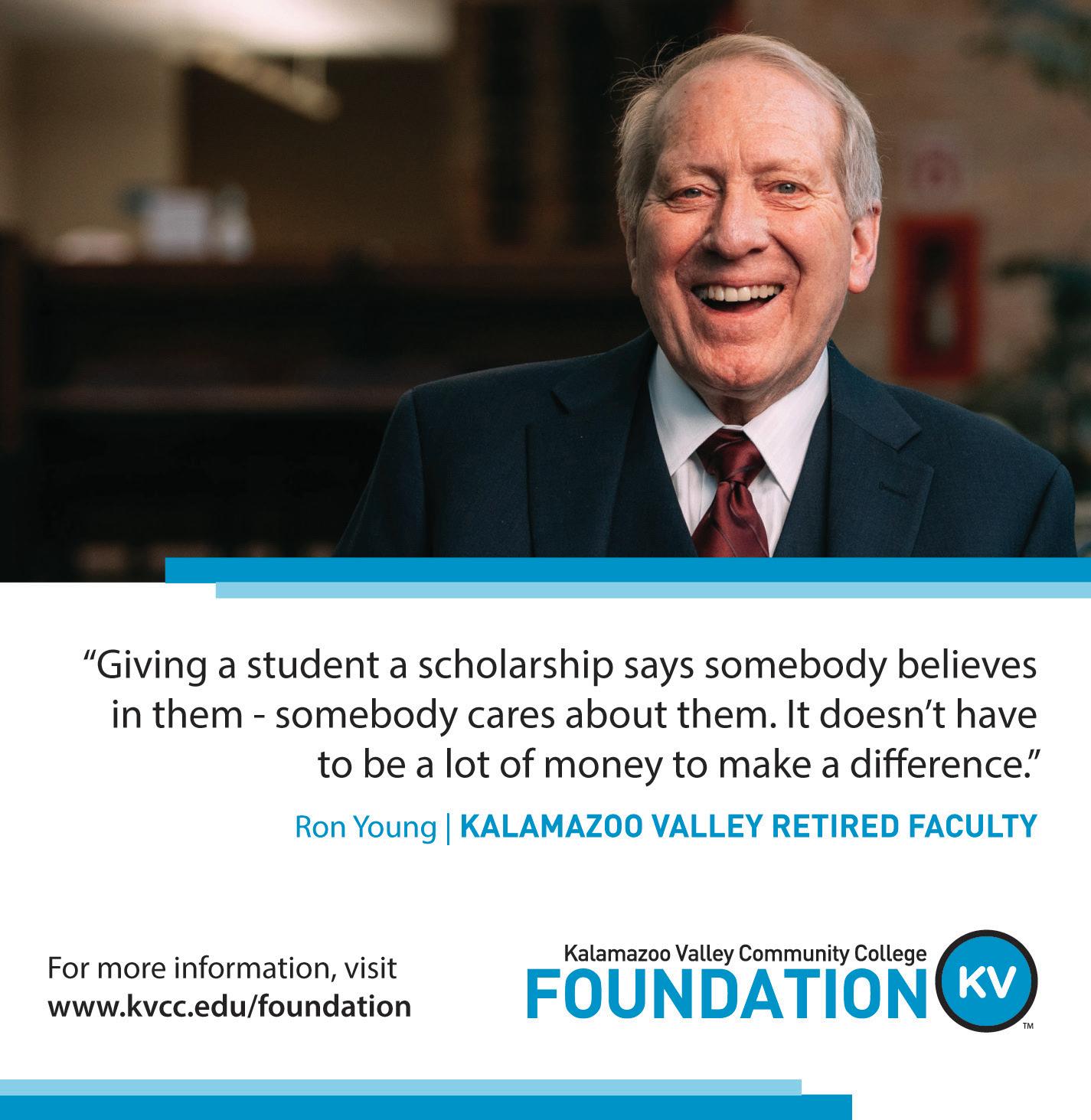


Kim Shaw (continued from page 34)
“I have an opportunity to help people who are making something and connect them to venues, which could lead into collaborations and other things,” says Shaw. “I feel so inspired, and that’s why I’m here.” How did you end up in Kalamazoo?
It feels like three lifetimes ago. I grew up in Livonia, in the greater Detroit area. When I was 19, my best friend moved to Kalamazoo to go to school. She fell in love with it and stayed here. I would come and visit, and then years down the road I went through a divorce and I was looking to go someplace else and decided to come here because I had a connection with my friend, but also because it’s such a supportive arts community. What did you do when you first got here?
When I got here, I was a single parent for a while. I worked at Martini's Restaurant for the first five years. I loved it, and it was a great way to meet people, because everybody would go there. I went back to school and got an illustration degree and an art education degree. I taught at the Kazoo School for seven years, I also taught with Education for the Arts and Kalamazoo Valley Community College and now I’m here. It’s exciting. I get to be an art nerd every day and talk to lots of creative people and help them to put on shows and find them grant opportunities.
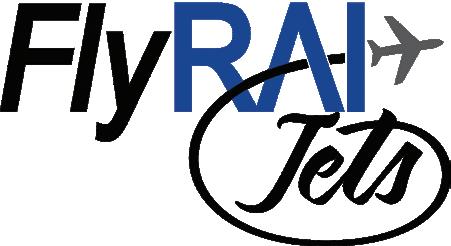
When I was teaching, creative safety was a big thing for me, like helping students to be open with their work and find confidence, because it can be vulnerable to create art. We’ve all grown up in a society where people say, ‘If you’re not like this, you’re no good.’ It became really important to me to help people to open themselves up and find their thing. I worked with students that had a variety of needs and found that there was always some sort of art making that could support them. That just sort of grew into working with adults. I feel very passionate about helping people to make their work and show their work, and not just visual arts but all of art. How would you describe your job?
There are about five programs that I am in charge of. Art Hops happen on the first Friday of every other month. For that, I help artists find venues and vice versa. I’m also in charge of Summertime Live! which are musical performances that happen from May through September all through the county. This year we have 12 venues and 85 performances. Right now I am collecting demos and having meetings with venues and artists so we can get everybody that wants to participate before places are booked up. What does a regular day look like for you?
Every day is different, and I love that. Well, except for the part where I make coffee and come here at 8 in the morning. I work 8 to
6 Tuesday through Friday, and sometimes I work in the evenings as well when we have receptions for shows or something like that. I also help with Creative Cafe, which is a radio podcast that airs Saturday mornings. I sit in my office and answer lots and lots of emails about programs and inquiries or go out of the office to meet an artist who has an idea about a show. They may not have done a show before, so I sit and talk through what it looks like. I’ll write letters to get permits to use a stage or find a sound person and align those for events.
Who has had the greatest impact on your career?
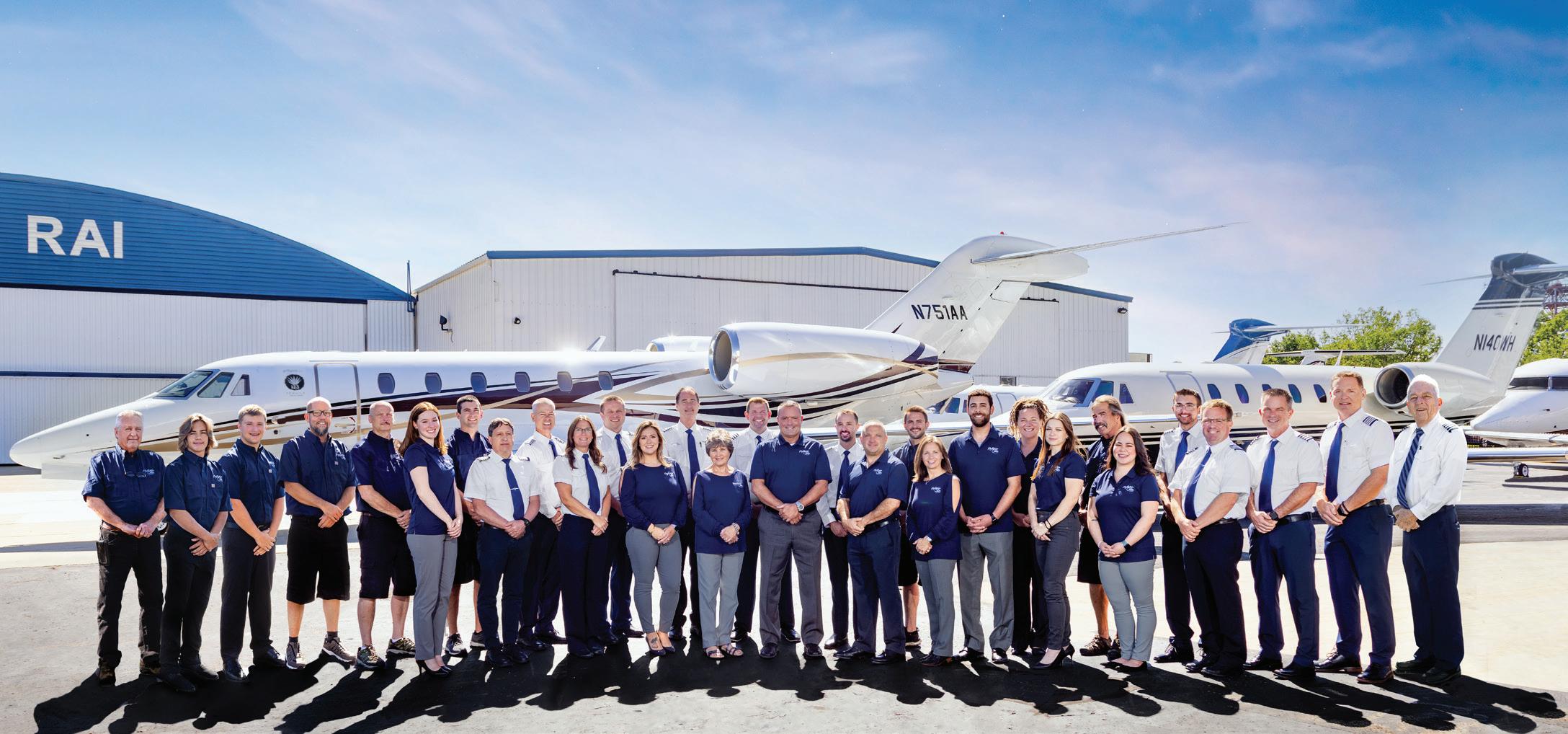
There are two people. Frida Kahlo’s story has been very influential. I know it’s cool to love Frida Kahlo, but I’ve loved her before it was cool. Knowing all that she overcame with her accident and the surgeries, that bravery is inspiring to me. Also, her struggle between the line of non-binary or bisexual. As somebody that came out later in life, that connection that I could be myself even when I couldn’t really be myself was inspiring.
The other person is my best friend. We’ve been friends since we were 7 years old, and it’s like our relationship has grown to this place of not really being a category. No matter what I’ve been through or who I’ve been, she’s stuck by my side. I can’t imagine being at this place in my life if it weren’t for her.
—Interview by Kalloli Bhatt, edited for length and clarityIn her new role at the Arts Council of Greater Kalamazoo, Kim Shaw wants to create opportunities for new, diverse local artists so that “everyone can see themselves in those spaces” where art is displayed or performed.
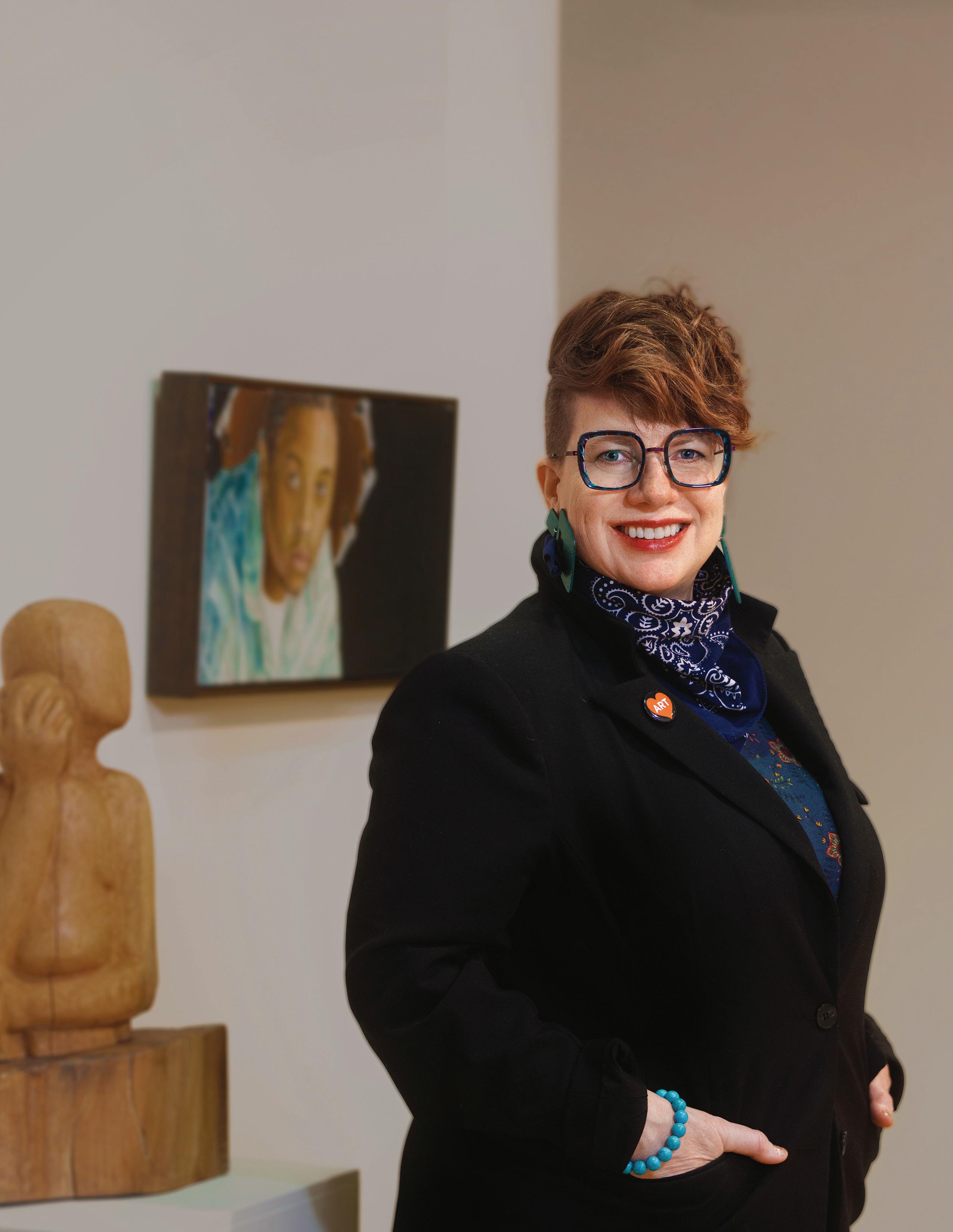
Shaw, a 48-year-old artist originally from Livonia, took over as the program director of the Arts Council in December. Having been trained in restorative justice, Shaw says she wants to improve the organization’s diversity and inclusion by including artists from all backgrounds in exhibitions and events and help aspiring artists find opportunities and grants by offering one-on-one guidance.
(continued on page 33)

